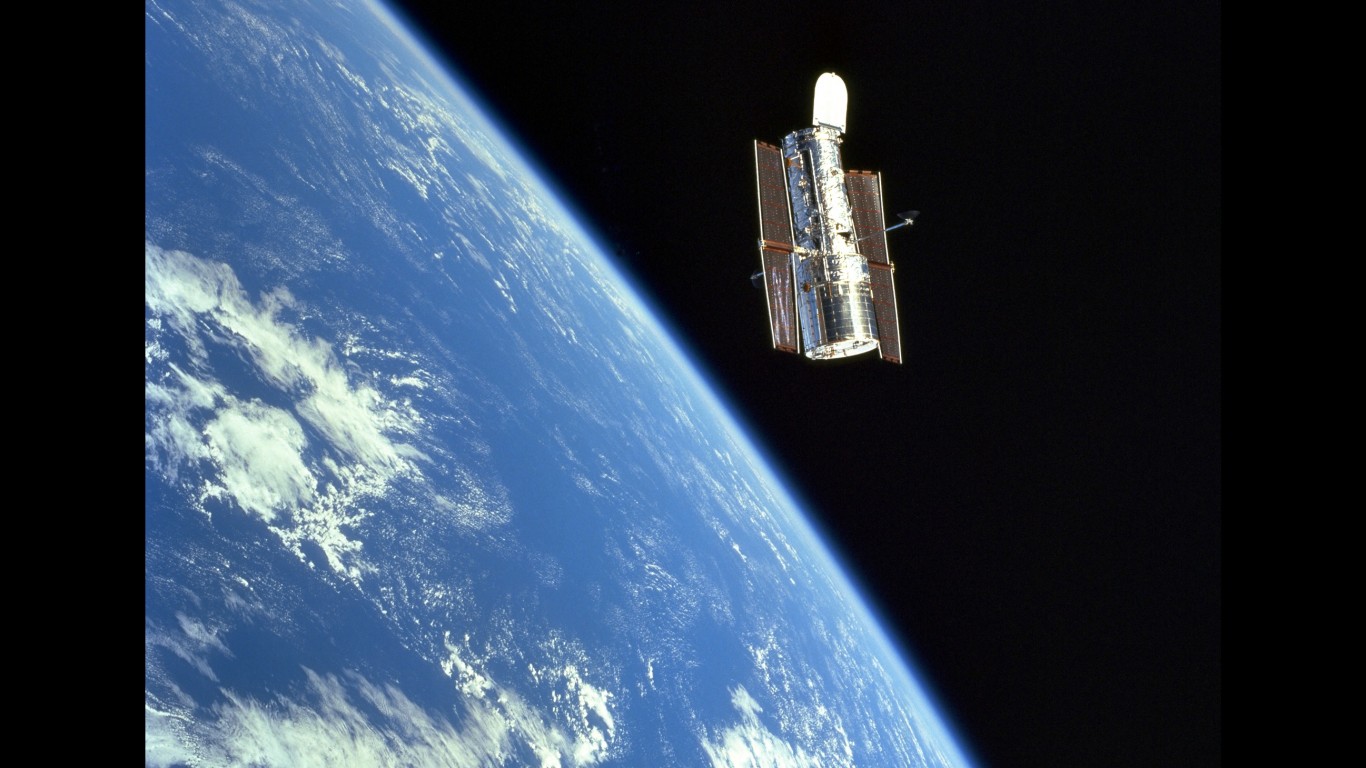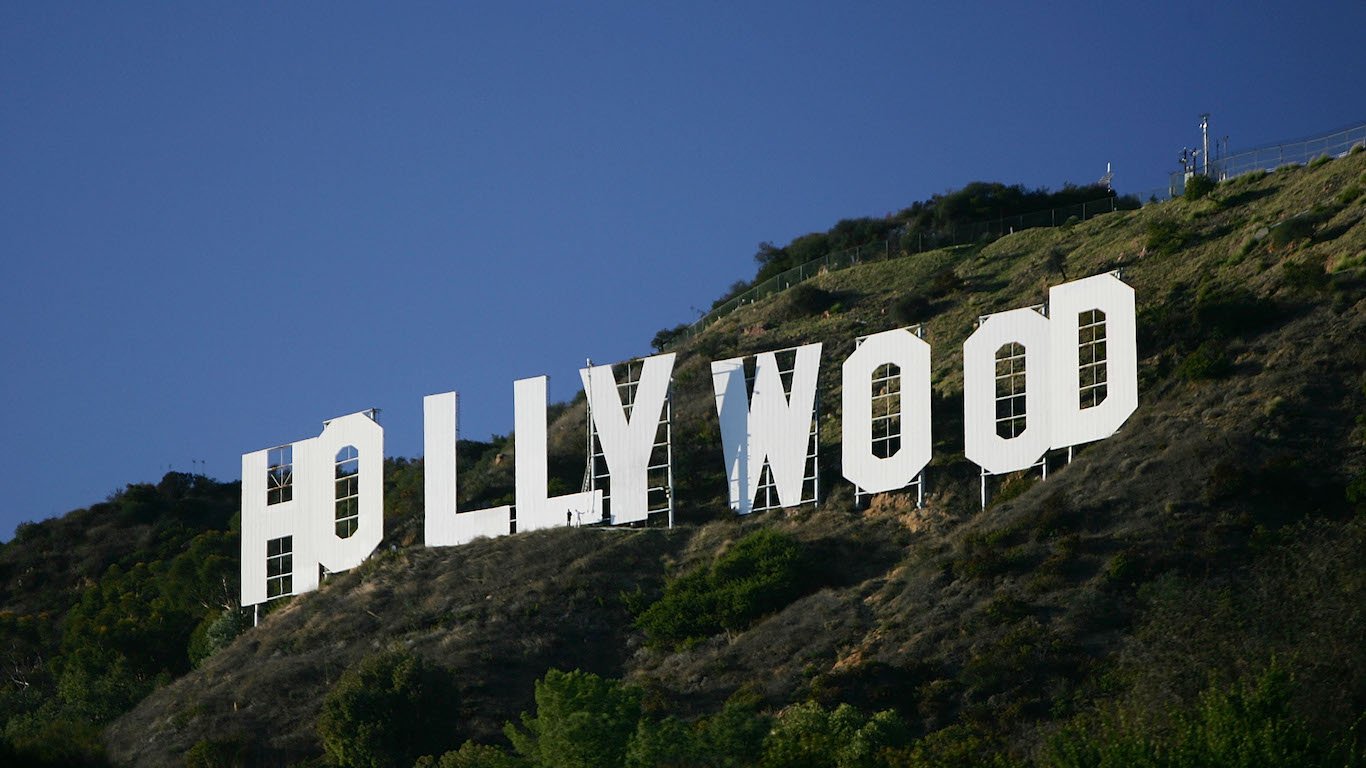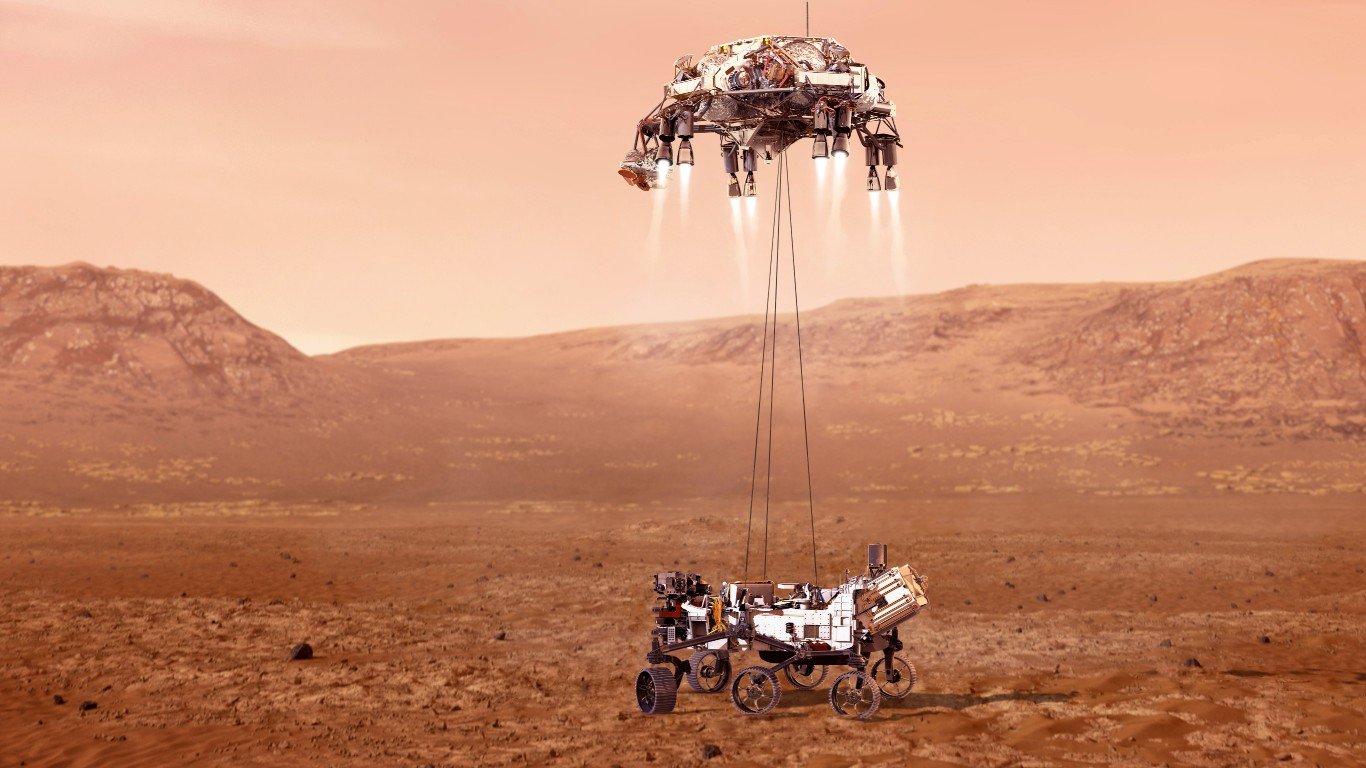
In 2021 NASA landed a new robotic rover Perseverance on Mars, the space agency’s most ambitious and successful effort in decades to directly study whether there ever was life on the red planet that is 126 million miles from Earth.
24/7 Tempo looked back at NASA’s most important events. When the Soviet Union launched Sputnik I, the first artificial satellite, on Oct. 4, 1957, it sent shockwaves around the world. The United States, which believed it held technological superiority over its communist rival, was shaken by the Soviet achievement. Sputnik was one of the biggest milestones in the space race — here are some others.
NASA was up to the challenge and would eventually lay claim to some of the greatest achievements in space exploration. To determine the most important events in NASA’s history, 24/7 Tempo reviewed events described on the NASA website, space.com, as well as sources such as Britannica.
Click here to see the most important events in NASA’s history
America officially joined the space race after the launch of Sputnik by creating the National Aeronautics and Space Administration, or NASA. For much of the next decade, the United States would be playing catch-up with the Soviet Union, which put the first man and woman into space, achieved the first spacewalk, and launched pioneering probes to other planets.
After technological glitches in the beginning, NASA began piling up its own achievements in space. Those included sending probes to other planets, Apollo 8’s orbit around the moon, and of course, the history-making moon landing of Apollo 11. These are the 12 people who have walked on the moon.
Since the lunar landing, the space story is more about cooperation. The United States and the Soviet Union teamed up for the Apollo-Soyuz Test Project in 1975, and many nations have collaborated on the International Space Station. As for the future, President Donald Trump told reporters in September that the “ultimate goal” for the U.S. space program is to go to Mars.
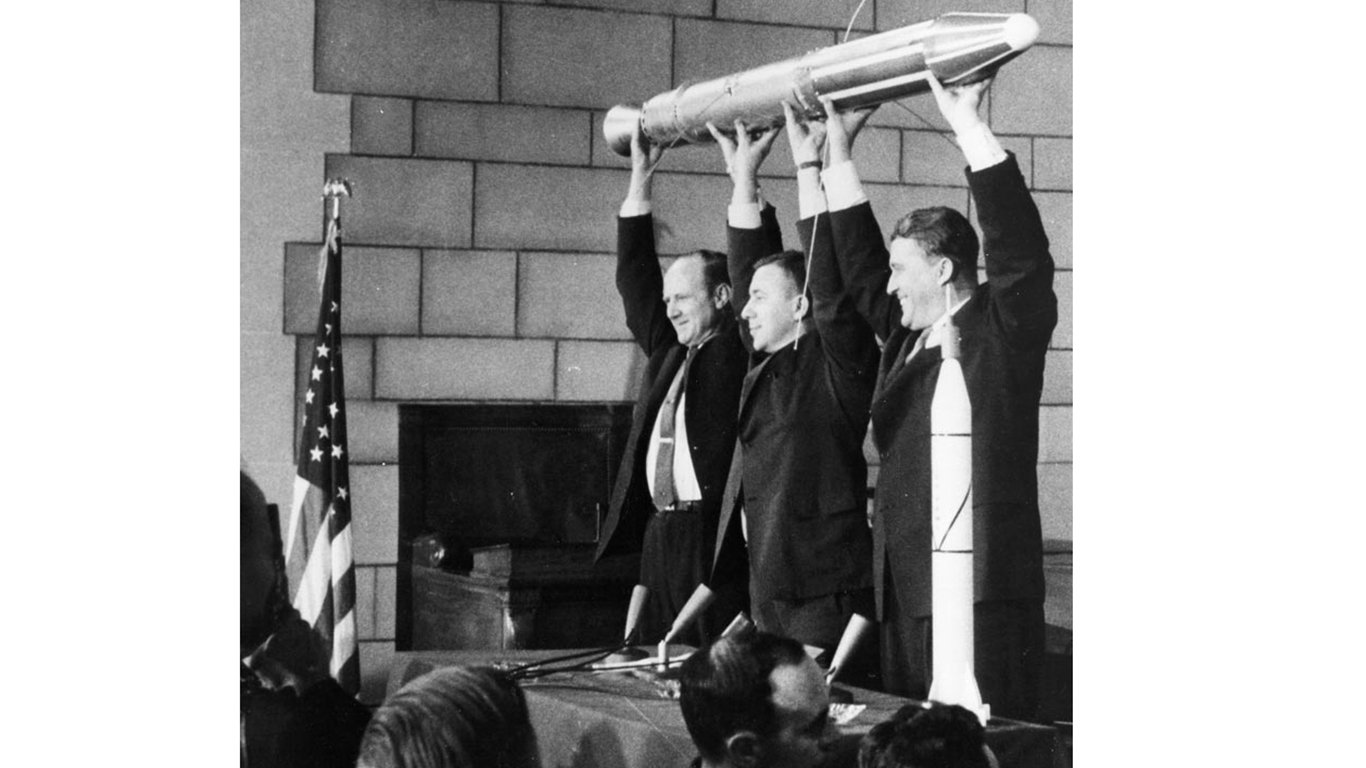
Source: NASA
1. NASA begins
> Date: Oct.1,1958
The National Aeronautics and Space Administration started operations in 1958. The program had an annual budget of $100 million and about 8,000 employees.
[in-text-ad]
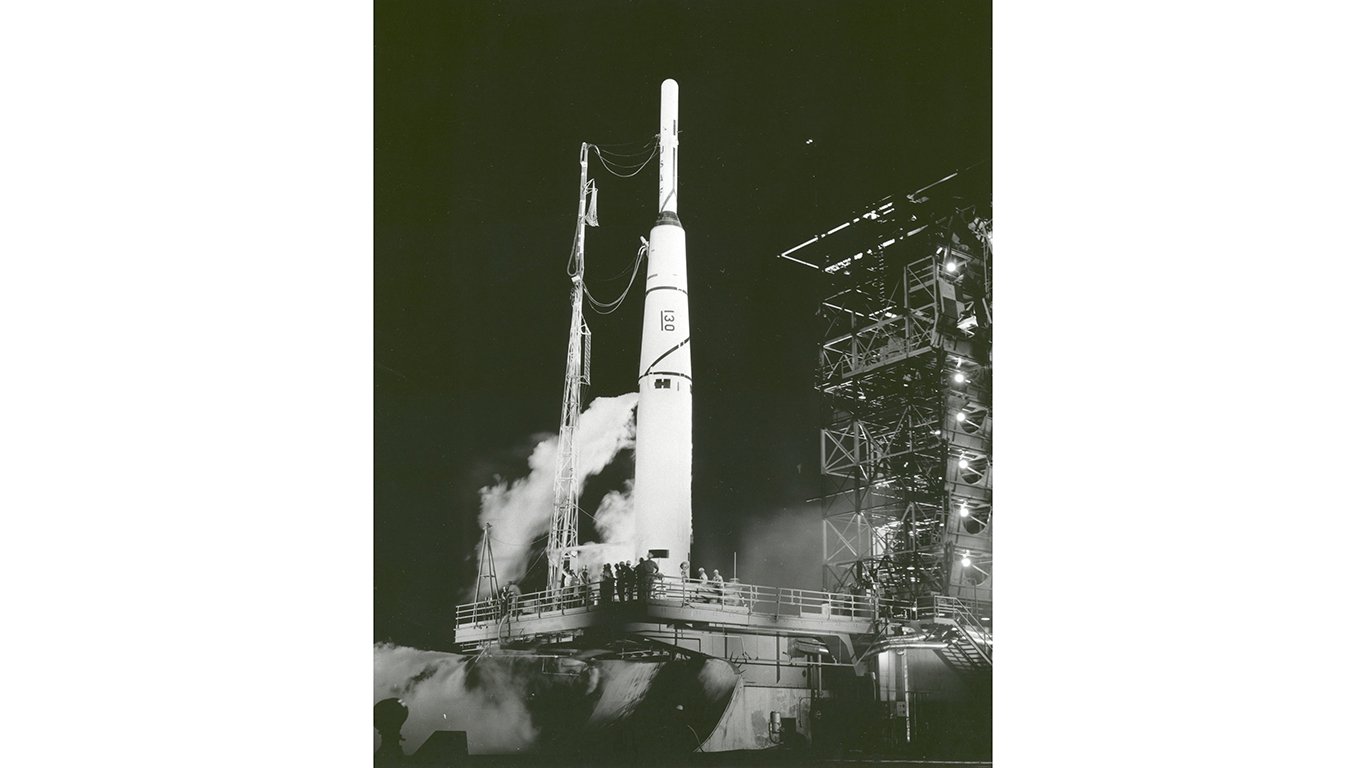
Source: NASA
2. Pioneer I launches
> Date: Oct. 11, 1958
The first mission NASA successfully launched was Pioneer I from Cape Canaveral, Florida. Its mission was to study the ionizing radiation, cosmic rays, magnetic fields, and micrometeorites near Earth and in lunar orbit.
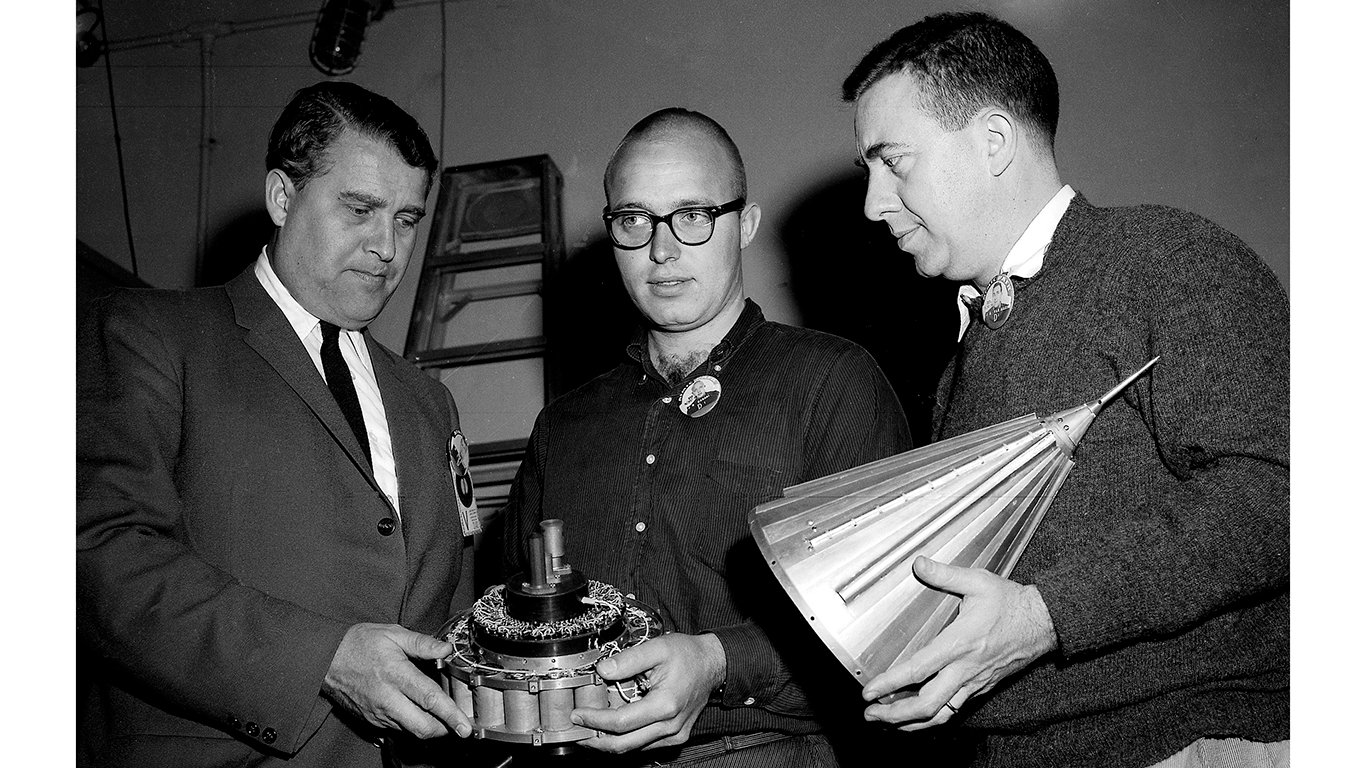
Source: NASA
3. Pioneer 4 flies by moon
> Date: March 3, 1959
Pioneer 4 was the first American spacecraft to leave Earth’s orbit and the first lunar flyby mission.
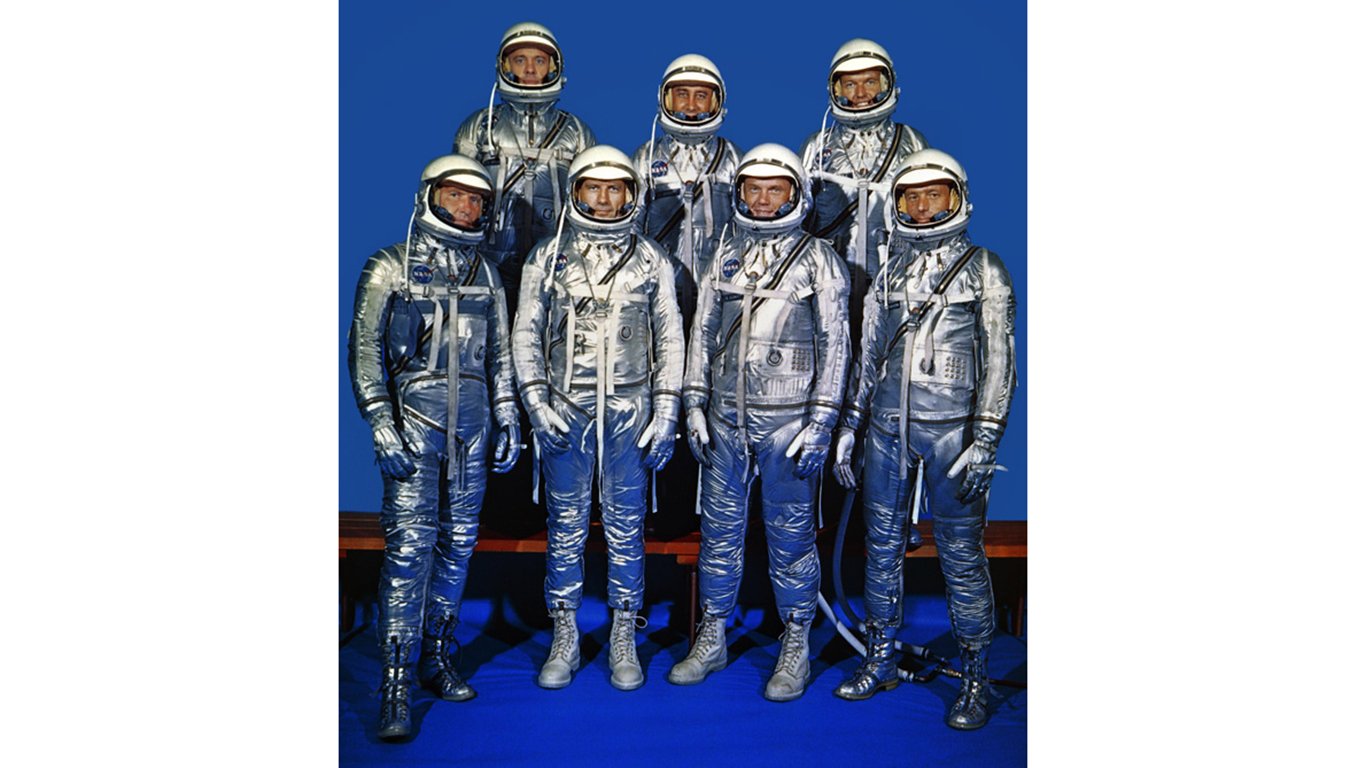
Source: NASA
4. Mercury astronauts named
> Date: April 9, 1959
The Mercury crew was announced following a two-month selection process. They were: John H. Glenn, Jr.; Walter M. Schirra, Jr.; Alan B. Shepard, Jr.; M. Scott Carpenter; Gordon Cooper; Virgil I. “Gus” Grissom; and Donald K. Slayton. The mission of the Mercury program was to put a man into orbit and return him safely to Earth.
[in-text-ad-2]
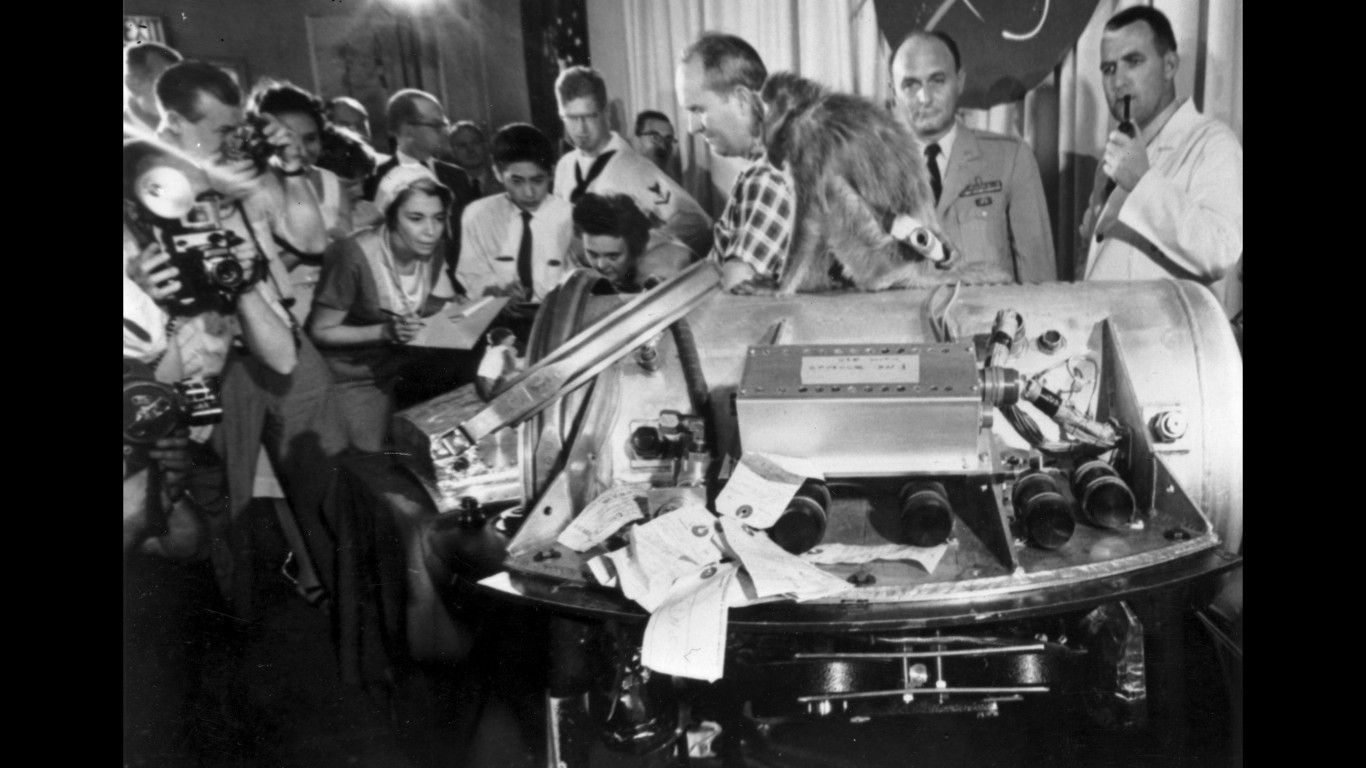
Source: Keystone / Getty Images
5. Monkeys go to space
> Date: May 28, 1959
NASA launched two monkeys, Able and Baker, on a Jupiter rocket on a suborbital flight to test the ability to launch from Cape Canaveral, Florida. Both animals were recovered from the flight, but Able died a short time later.
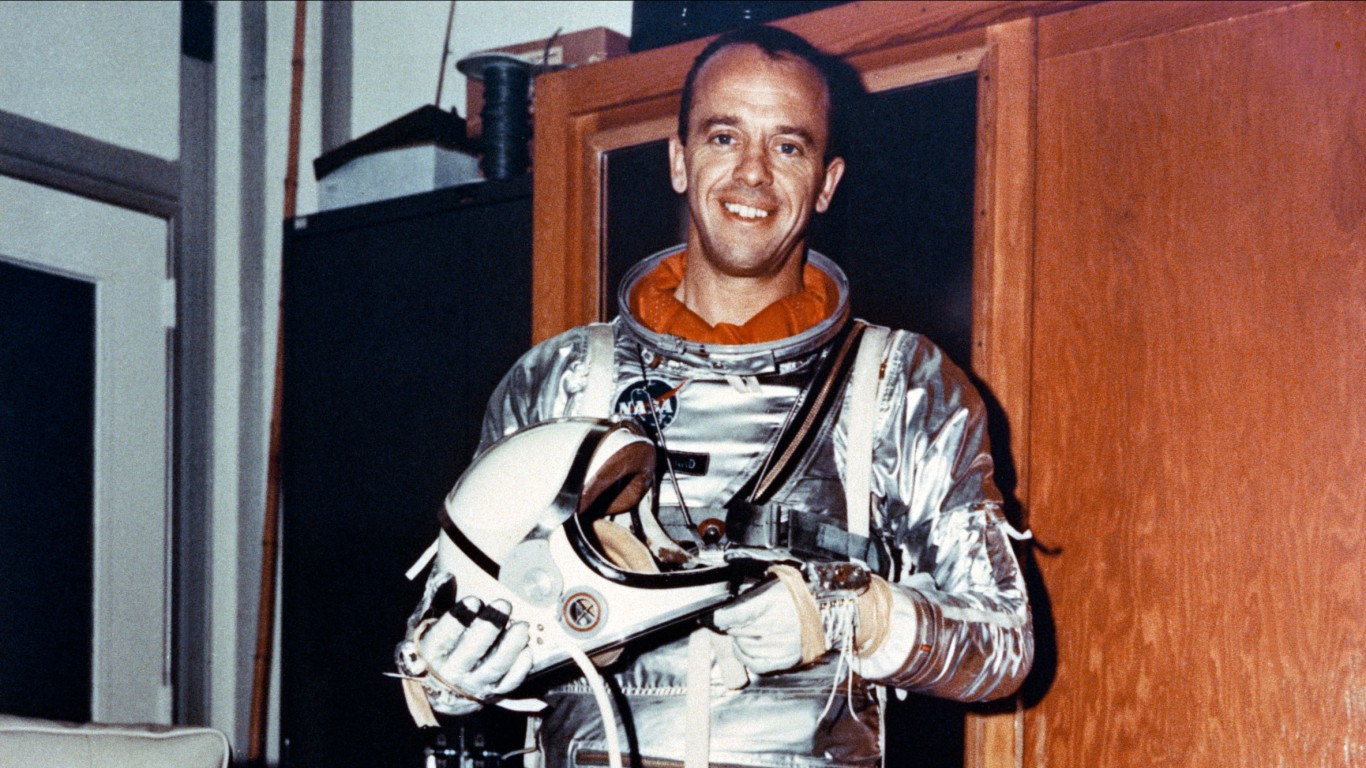
Source: nasacommons / Flickr
6. Shepard is first American in space
> Date: May 5, 1961
Alan B. Shepard Jr. became the first American to fly into space aboard the Freedom 7 Mercury spacecraft. His voyage demonstrated that people can control a vehicle during weightlessness and high G stresses. He reached a top speed of 5,100 miles per hour, and his flight lasted 14.8 minutes.
[in-text-ad]
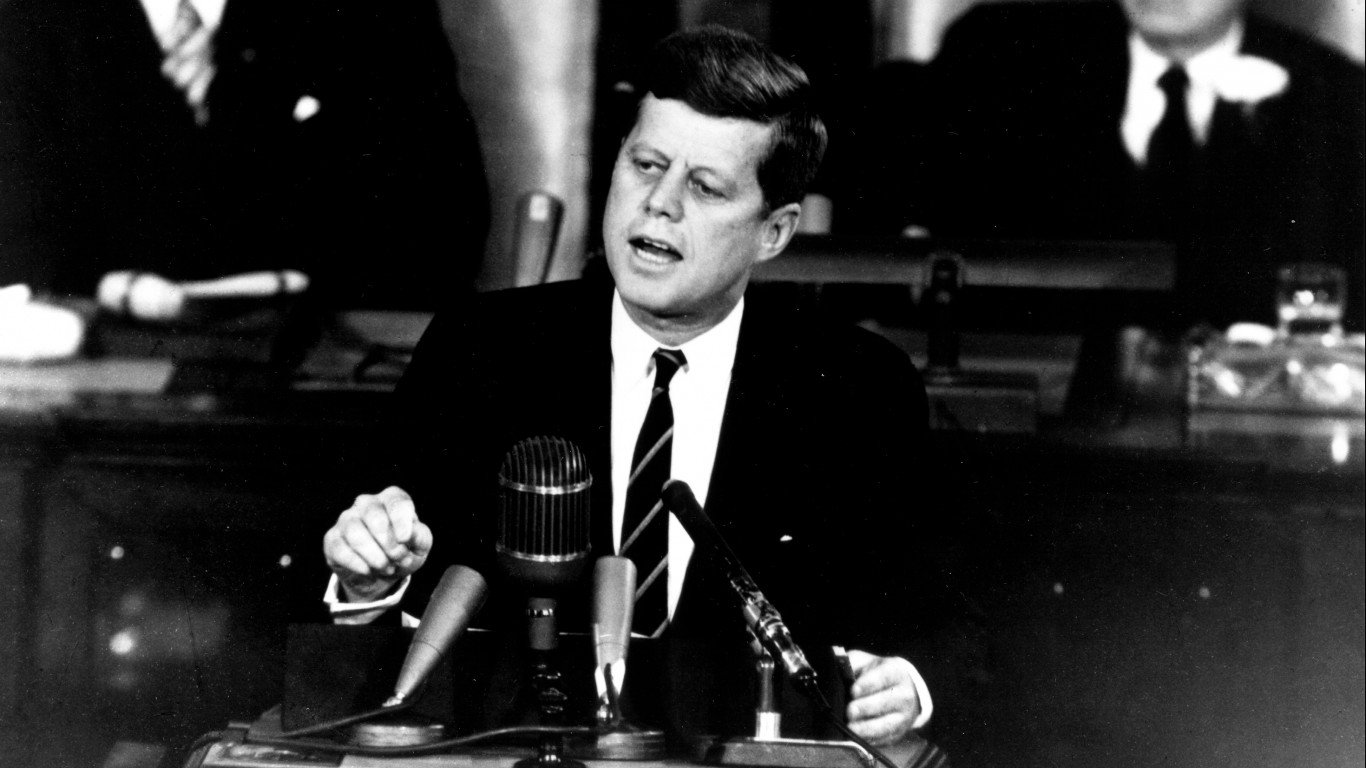
Source: Public Domain / Wikimedia Commons
7. Kennedy vows to go to moon
> Date: May 25, 1961
In a speech before Congress, newly elected President John F. Kennedy committed the United States to landing a man on the moon by the end of the decade and returning him safely to Earth.
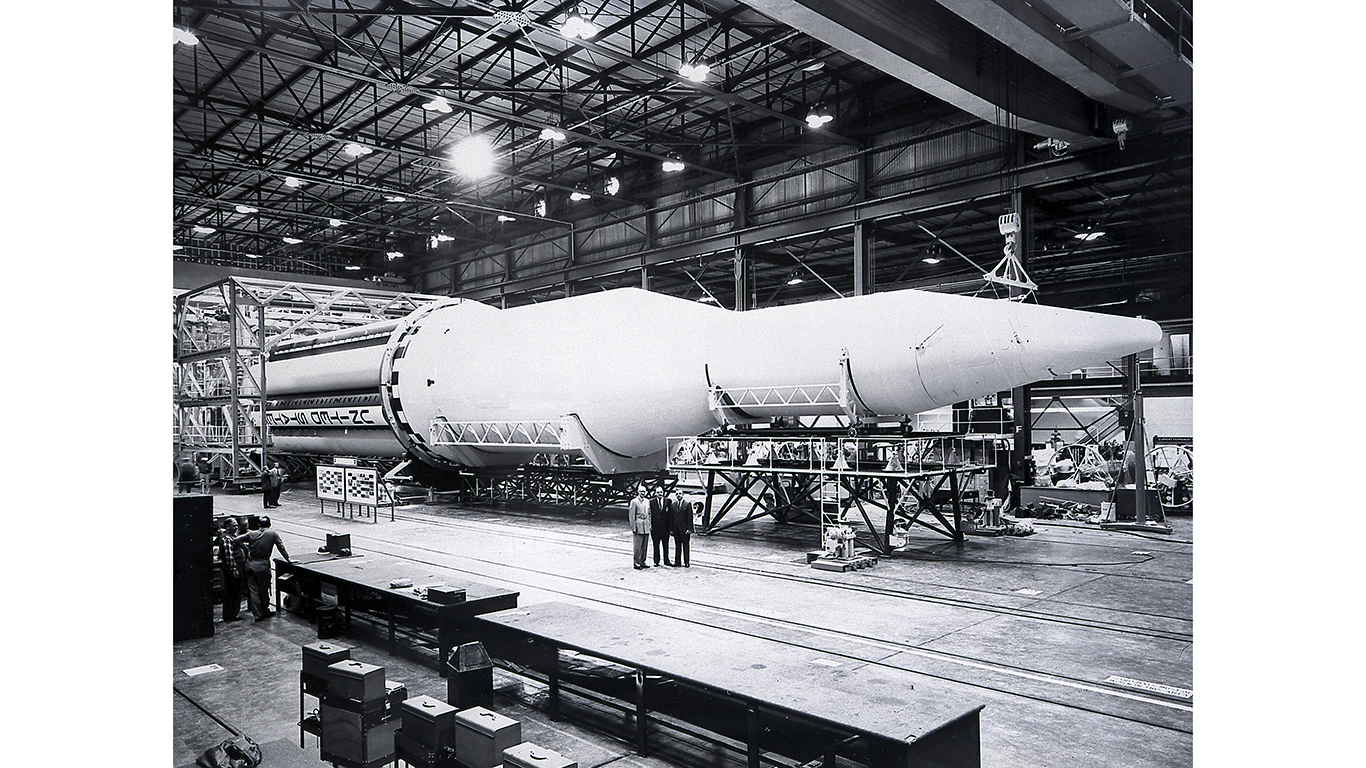
Source: NASA
8. NASA tests Saturn rocket
> Date: Oct. 27, 1961
NASA successfully tested the Saturn 1 rocket — the test vehicle that paved the way for the development of the Saturn V that carried American astronauts to the moon.
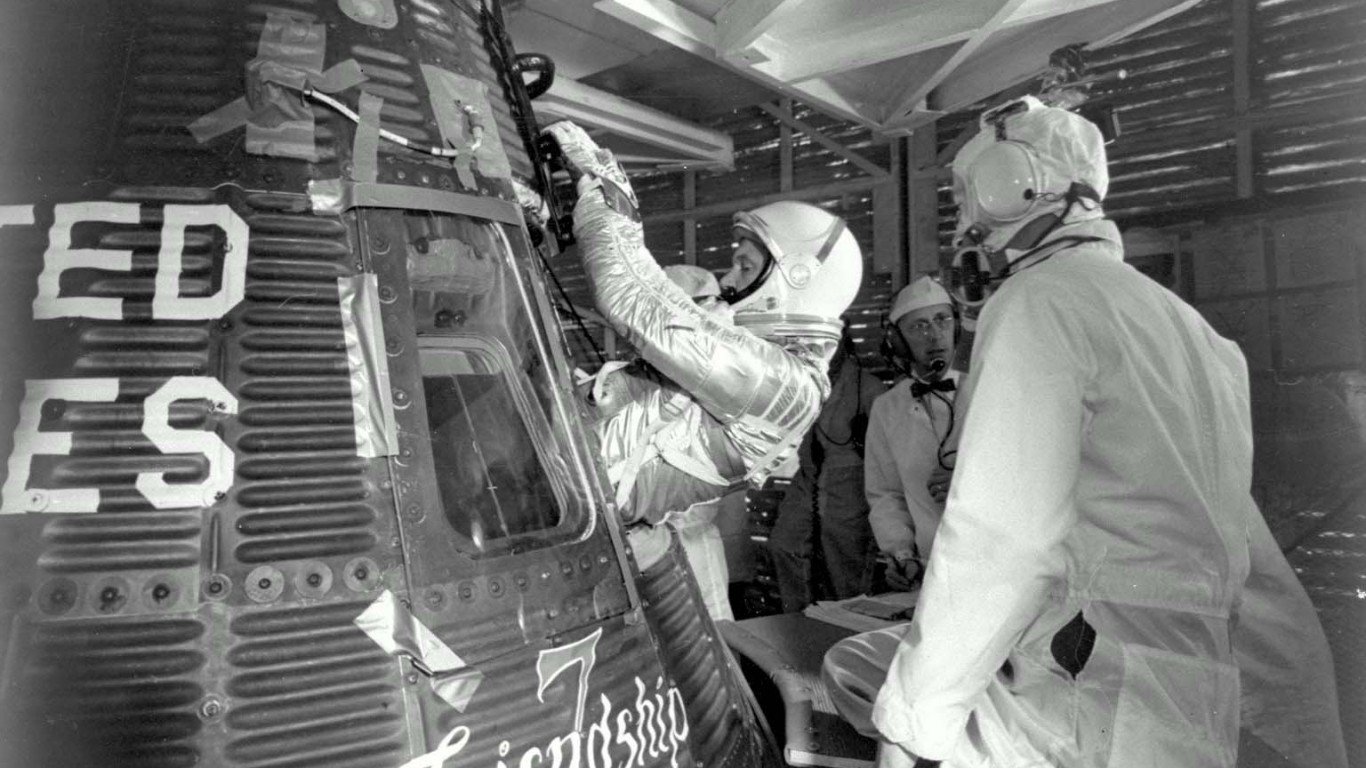
Source: nasacommons / Flickr
9. John Glenn orbits Earth
> Date: Feb. 20, 1962
John Glenn became a national hero as the first American to circle the Earth, orbiting the planet three times aboard the Friendship 7 Mercury spacecraft. In 1998, Glenn would become the oldest person to go into space at age 77.
[in-text-ad-2]
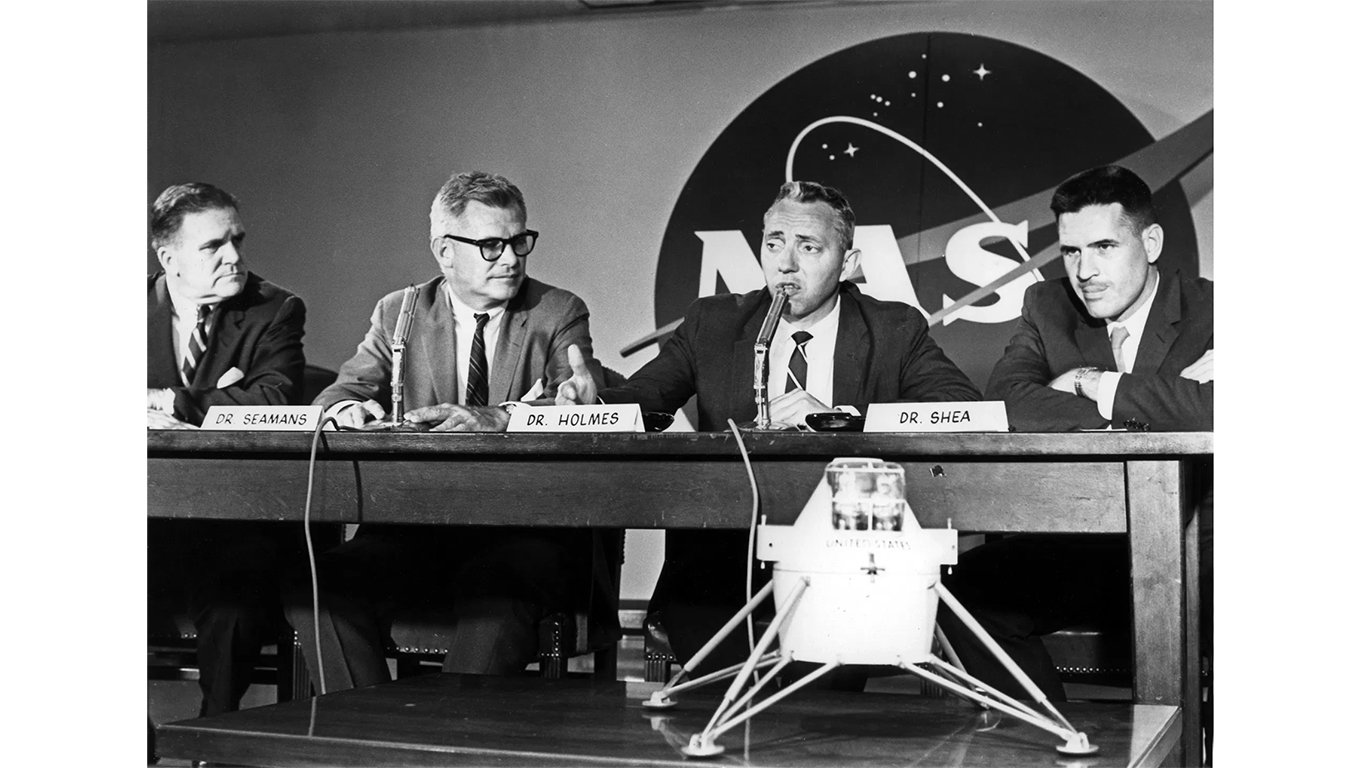
Source: NASA
10. NASA decides on moon strategy
> Date: June 7, 1962
NASA leaders settled on the method of going to the moon, with advocates for lunar-orbit rendezvous winning out over those favoring Earth-orbit rendezvous. The decision cleared the way for developing the hardware needed to accomplish the president’s goal by his timetable.
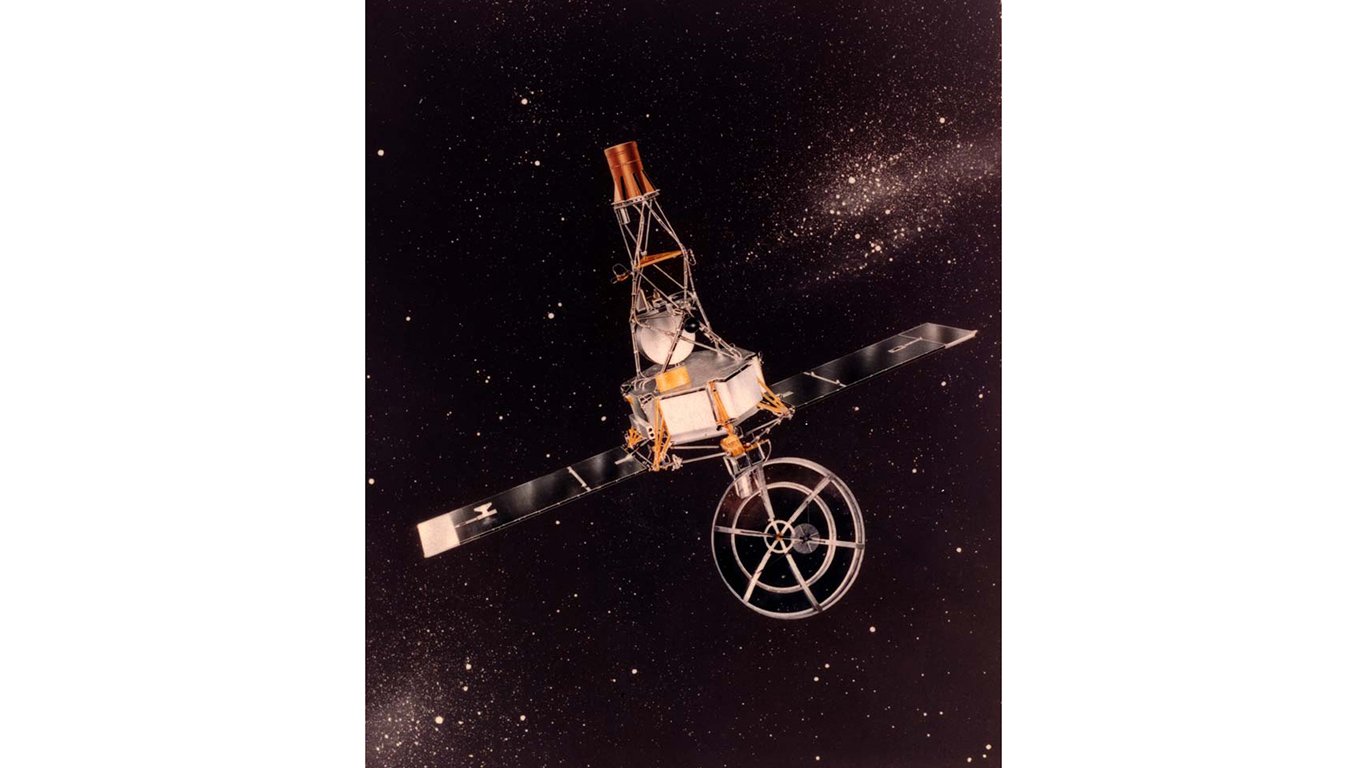
Source: NASA / JPL
11. Spacecraft flies by Venus
> Date: Dec, 14, 1962
Mariner 2 accomplished the first flyby of a planet when it soared past Venus. The spacecraft was also the first to measure the solar wind — charged particles flowing from the Sun.
[in-text-ad]
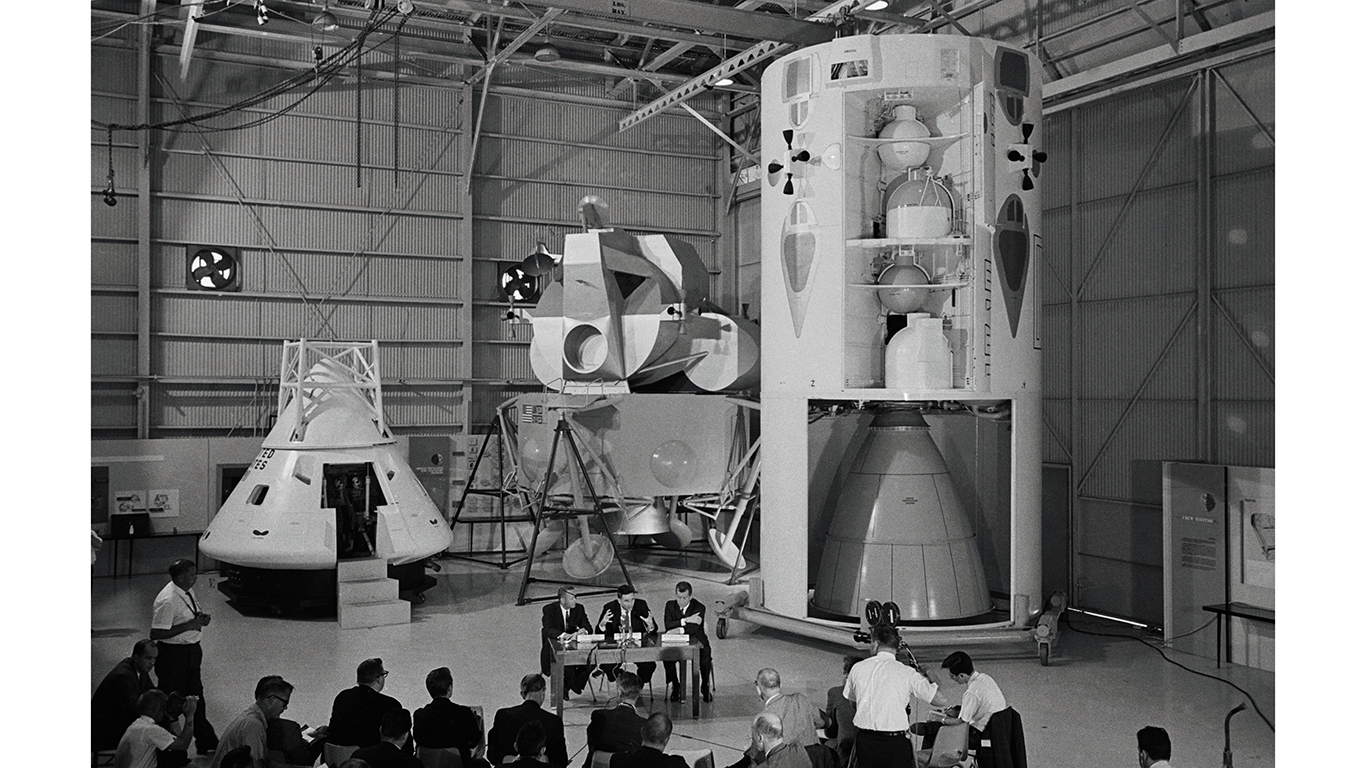
Source: Bettman / Getty Images
12. Apollo goes into orbit
> Date: May 28, 1964
America put the first Apollo Command Module in orbit. The capsule was launched during an automated test flight atop a Saturn I rocket. The purpose of the test was to show the compatibility of the spacecraft with the launch vehicle for orbital flights.
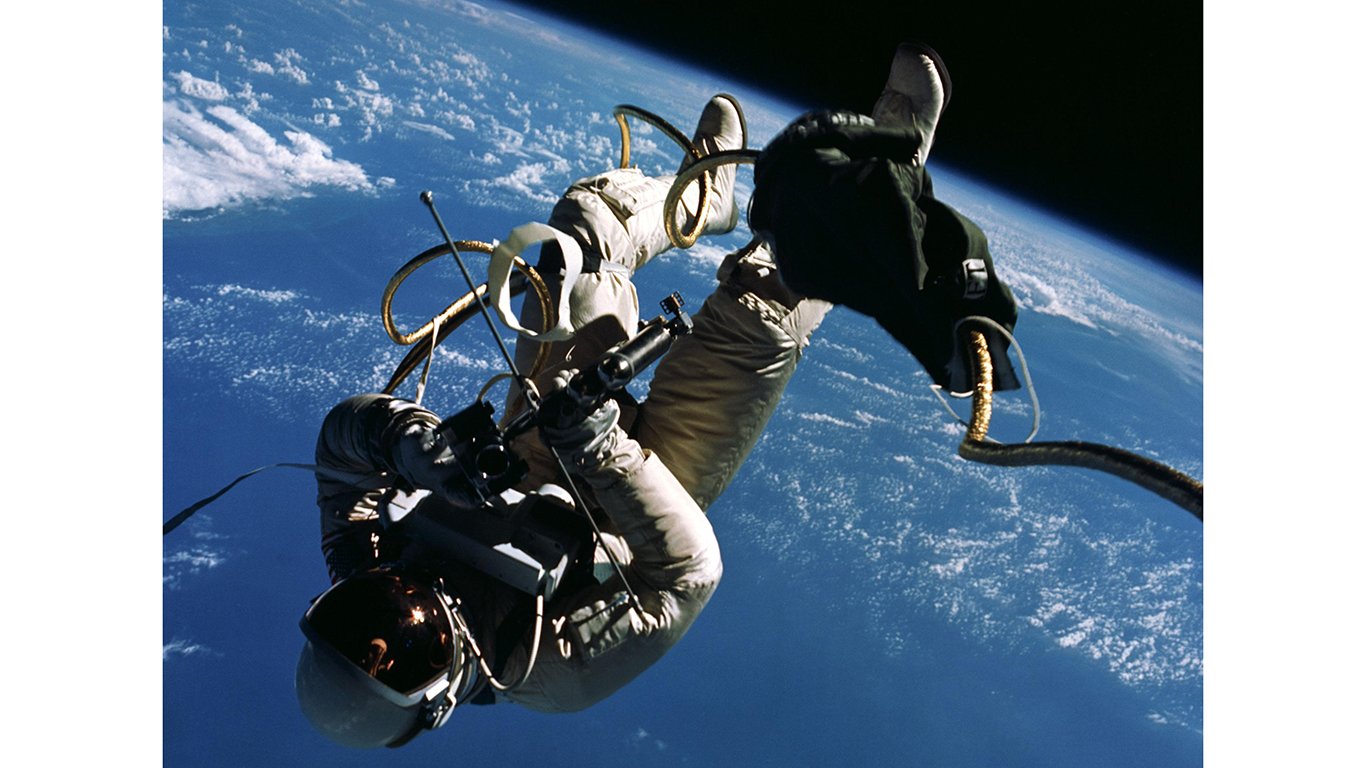
Source: NASA
13. White takes walk in space
> Date: June 3, 1965
Edward H. White II performed the first spacewalk by an American during the Gemini IV flight, which was the second piloted Gemini mission. White’s walk lasted 23 minutes. This task needed to be accomplished before making a moon landing.
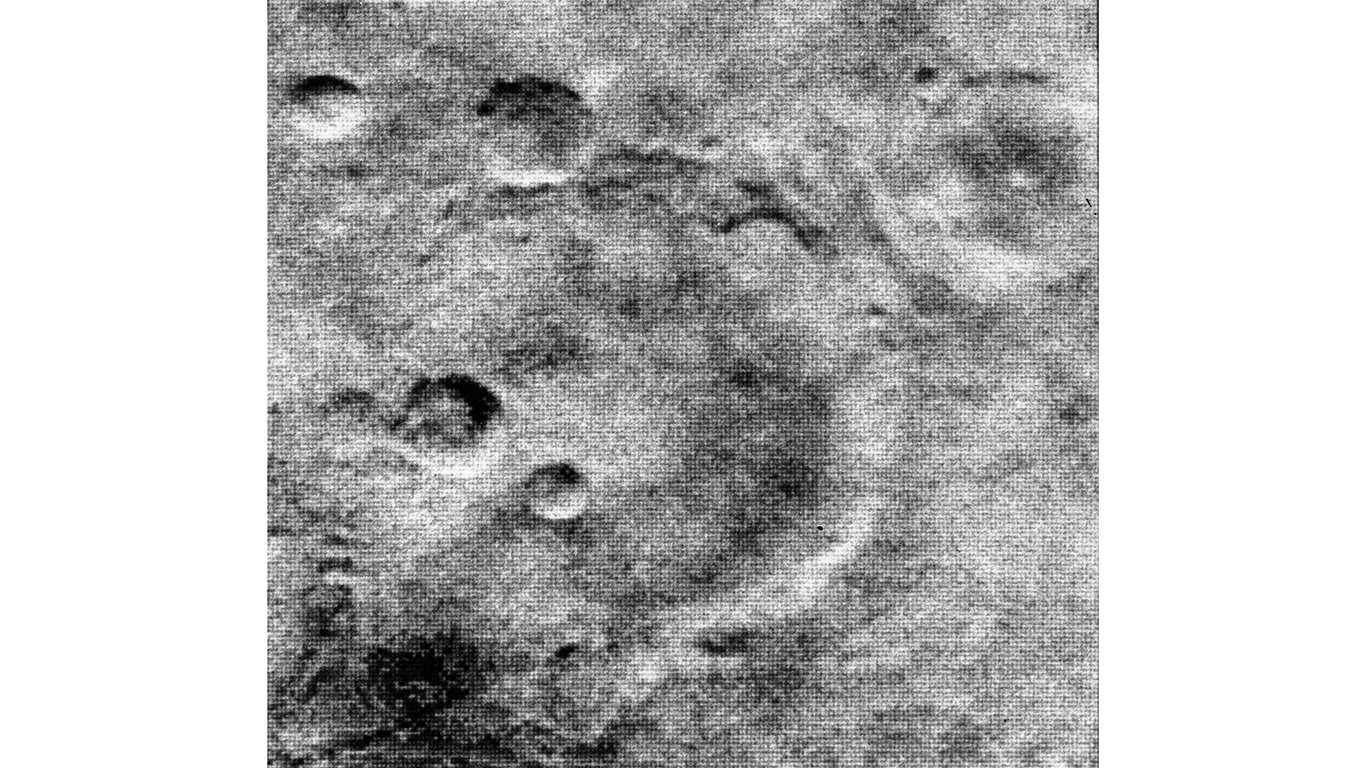
Source: NASA / JPL
14. Mars seen up close
> Date: July 15, 1965
Eight months after launch, the space probe Mariner 4 traveled to within 6,118 miles of Mars, sending back close-up images of the planet. The spacecraft lasted about three years in solar orbit, and provided studies of the solar wind.
[in-text-ad-2]
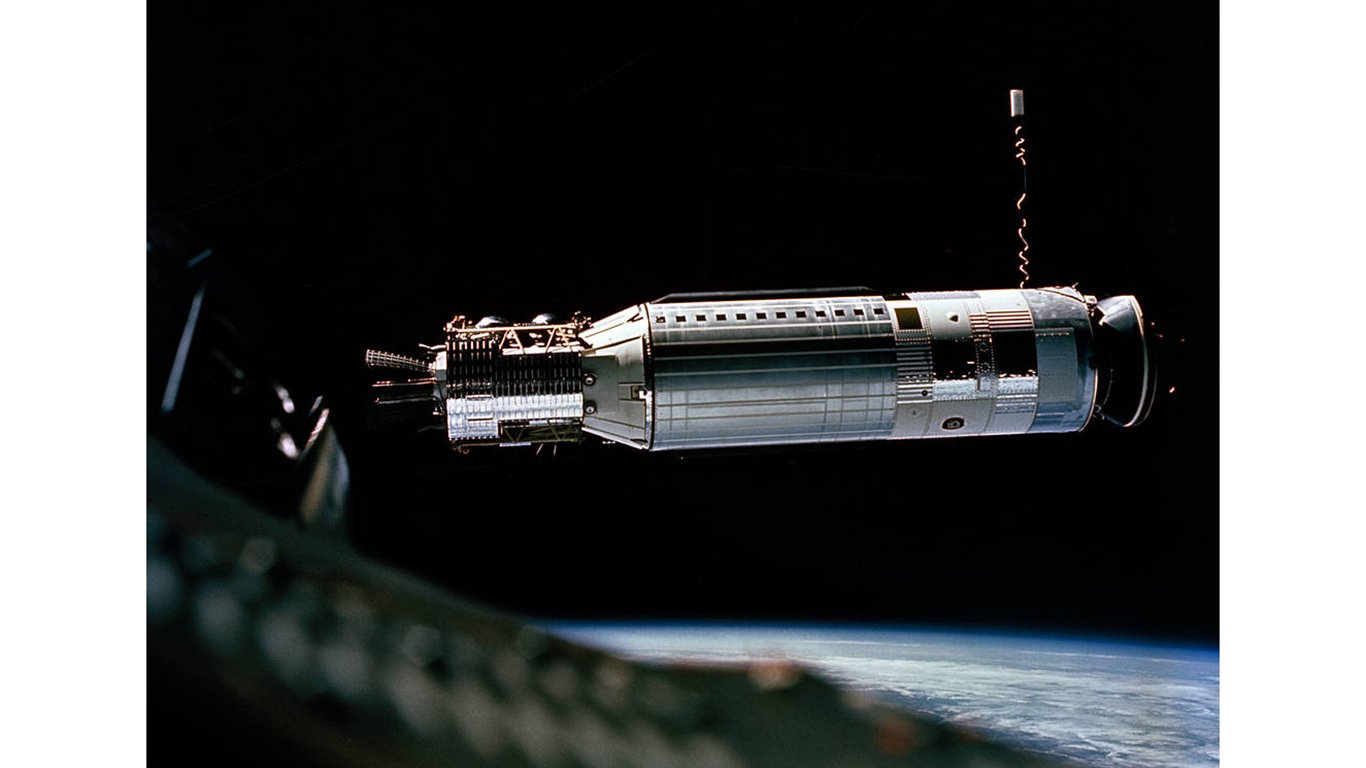
Source: NASA
15. Astronauts achieve first orbital docking
> Date: March 16, 1966
In order for the lunar module to be able to dock with the spacecraft upon returning from the moon, it was important to test the docking maneuver. Commander Neil A. Armstrong and Pilot David Scott docked their Gemini VIII spacecraft with the Agena target vehicle, the first linking of two spacecraft in Earth orbit. The two spacecraft were in the third orbit of the mission, over Mexico’s west coast.
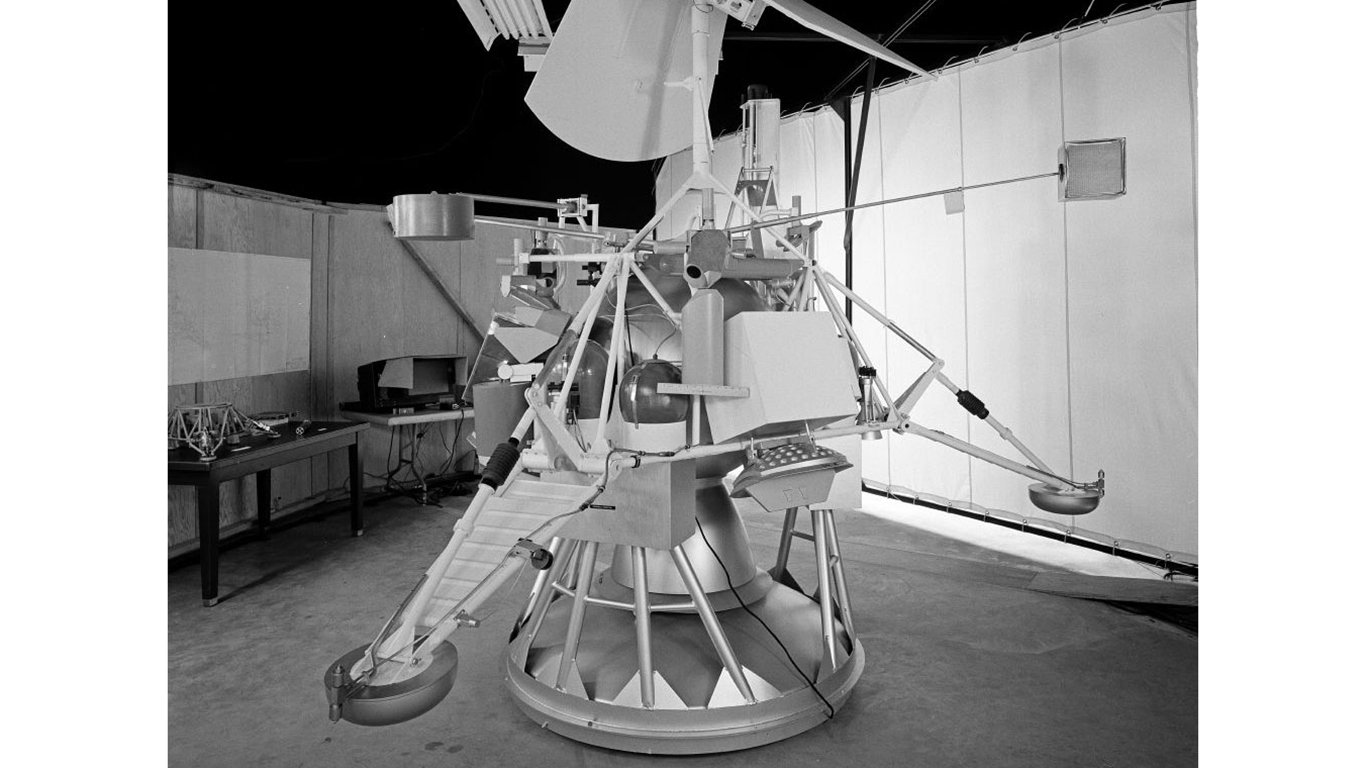
Source: NASA / JPL
16. Spacecraft lands on moon
> Date: June 2, 1966
Surveyor 1 landed on the moon, the first American spacecraft to land softly on the lunar surface. It touched down on the Ocean of Storms, considered a possible future lunar landing site for the Apollo mission. The spacecraft transmitted more than 10,000 photographs from the surface. The mission was deemed a complete success and demonstrated the effectiveness of the technology critical to the success of future lunar missions.
[in-text-ad]
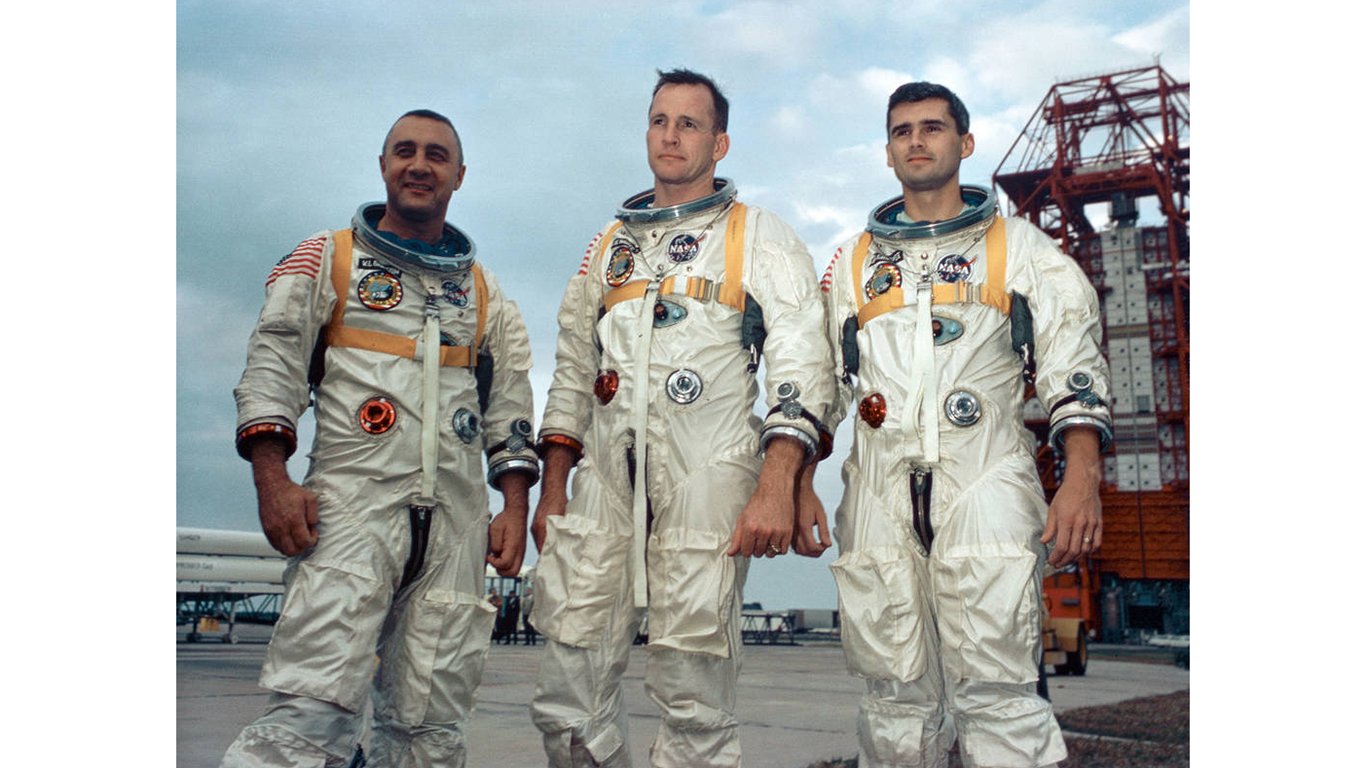
Source: NASA
17. Fire kills astronauts
> Date: Jan. 27, 1967
During a simulation aboard the Apollo spacecraft on the launchpad at Kennedy Space Center in Florida, a flash fire ignited in the pure oxygen atmosphere of the capsule, killing astronauts Gus Grissom, Ed White, and Roger Chaffee. It was the first fatal accident directly attributed to the U.S. space program, and it led to a redesign of the spacecraft. The Apollo mission of sending astronauts to the moon was resumed in October 1968.
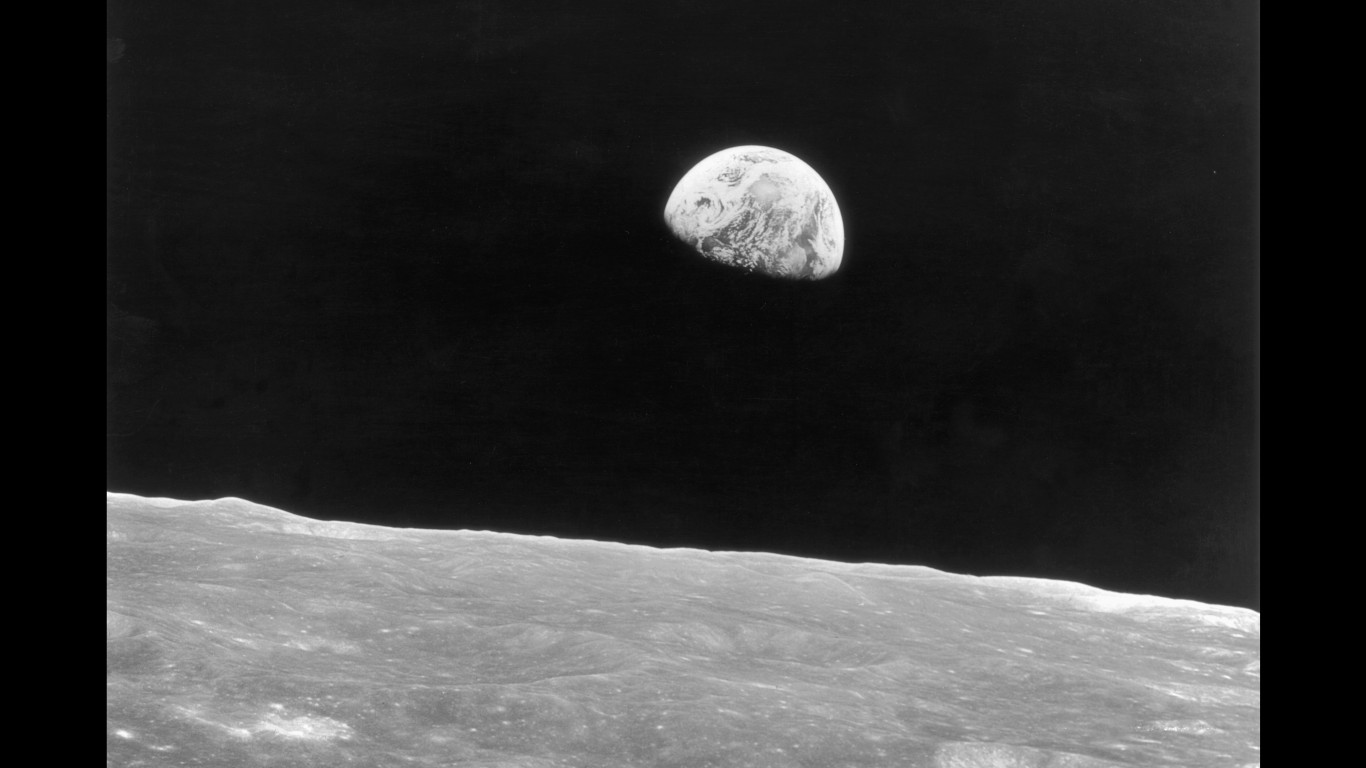
Source: Keystone / Getty Images
18. Apollo 8 orbits moon
> Date: Dec. 21-27, 1968
The crew of Apollo 8 — Frank Borman, James Lovell Jr., and William Anders — were the first people to leave Earth’s orbit, reach the moon, orbit it, and return safely to Earth. The photos they took of the moon and the data they gathered were critical in preparing the United States for the moon landing the following year.
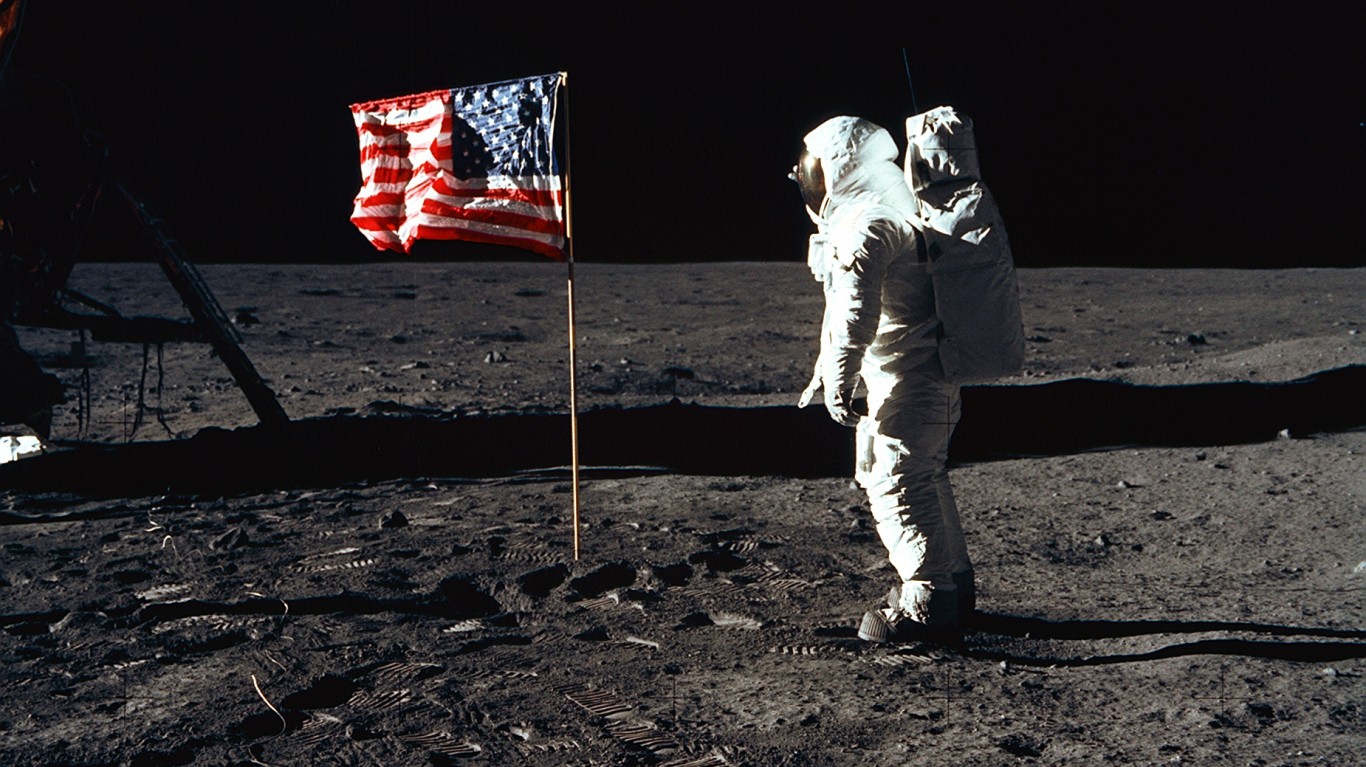
Source: NASA / Getty Images
19. Men land on moon
> Date: July 20, 1969
Neil A. Armstrong became the first person to set foot on another world on July 20, 1969. Buzz Aldrin joined him on the lunar surface a few minutes later. The two astronauts left behind scientific instruments, an American flag, and a plaque with the inscription: “Here Men From Planet Earth First Set Foot Upon the moon. July 1969 A.D. We came in Peace For All Mankind.” Four days later, they returned to Earth, fulfilling President Kennedy’s pledge of landing men on the moon and returning them safely to Earth before the end of the decade.
[in-text-ad-2]
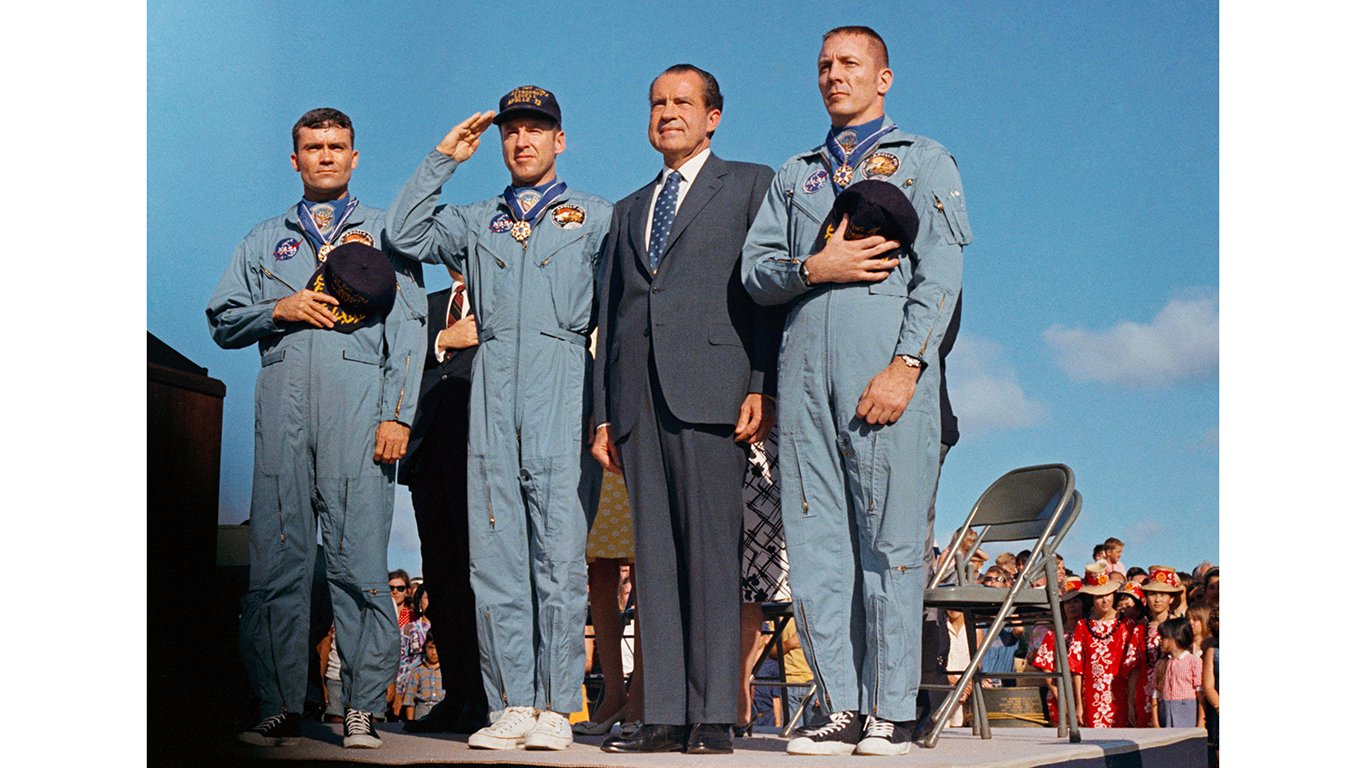
Source: NASA
20. Apollo dodges disaster
> Date: April 11-17, 1970
NASA averted disaster on the Apollo 13 mission, rescuing astronauts Fred Haise, Jack Swigert, and Jim Lovell after a life-threatening accident. About 56 hours into the flight and before the astronauts landed on the moon, an oxygen tank ruptured and damaged some of the power, electrical, and life support systems. NASA got the astronauts safely home after discovering the Aquarius lunar module — a self-contained spacecraft not damaged by the accident — could provide life support for the return trip.
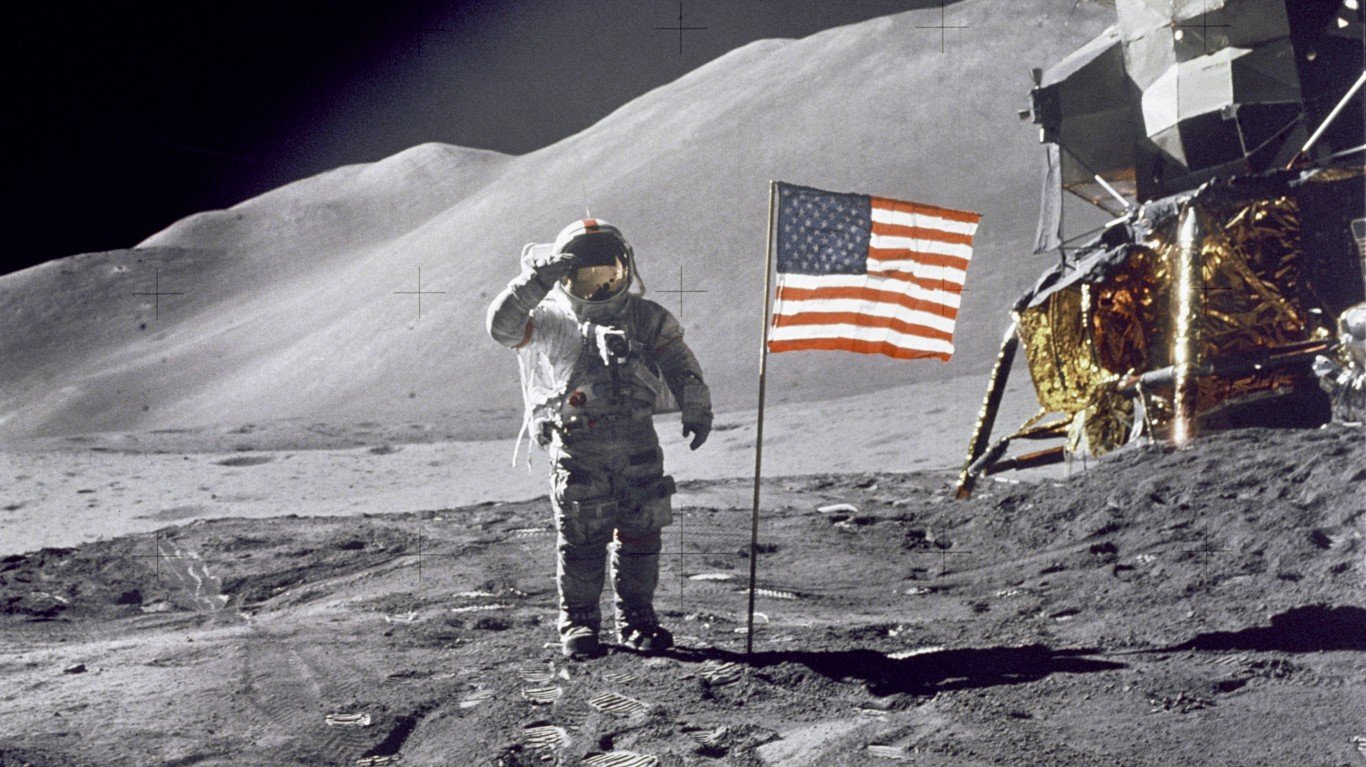
Source: nasacommons / Flickr
21. Land rover debuts
> Date: July 26-Aug. 7, 1971
Apollo 15 was the first mission to include the lunar rover, which extended the range the astronauts could reach on the moon. Moonwalkers David Scott and James Irwin brought back 173 pounds of moon rocks.
[in-text-ad]
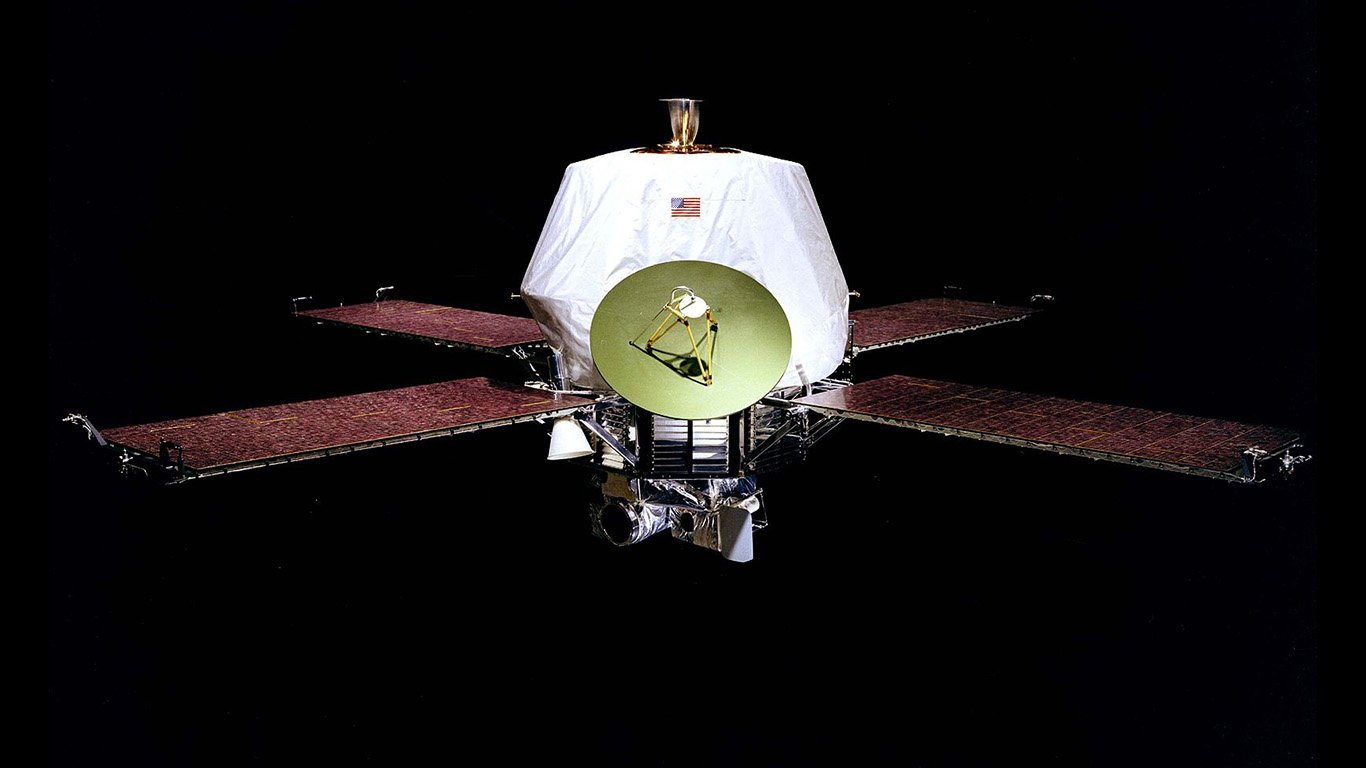
Source: NASA / Wikimedia Commons
22. Spacecraft orbits Mars
> Date: Nov. 13, 1971
Mariner 9 made history by becoming the first human-made object to orbit another planet when it circled Mars.
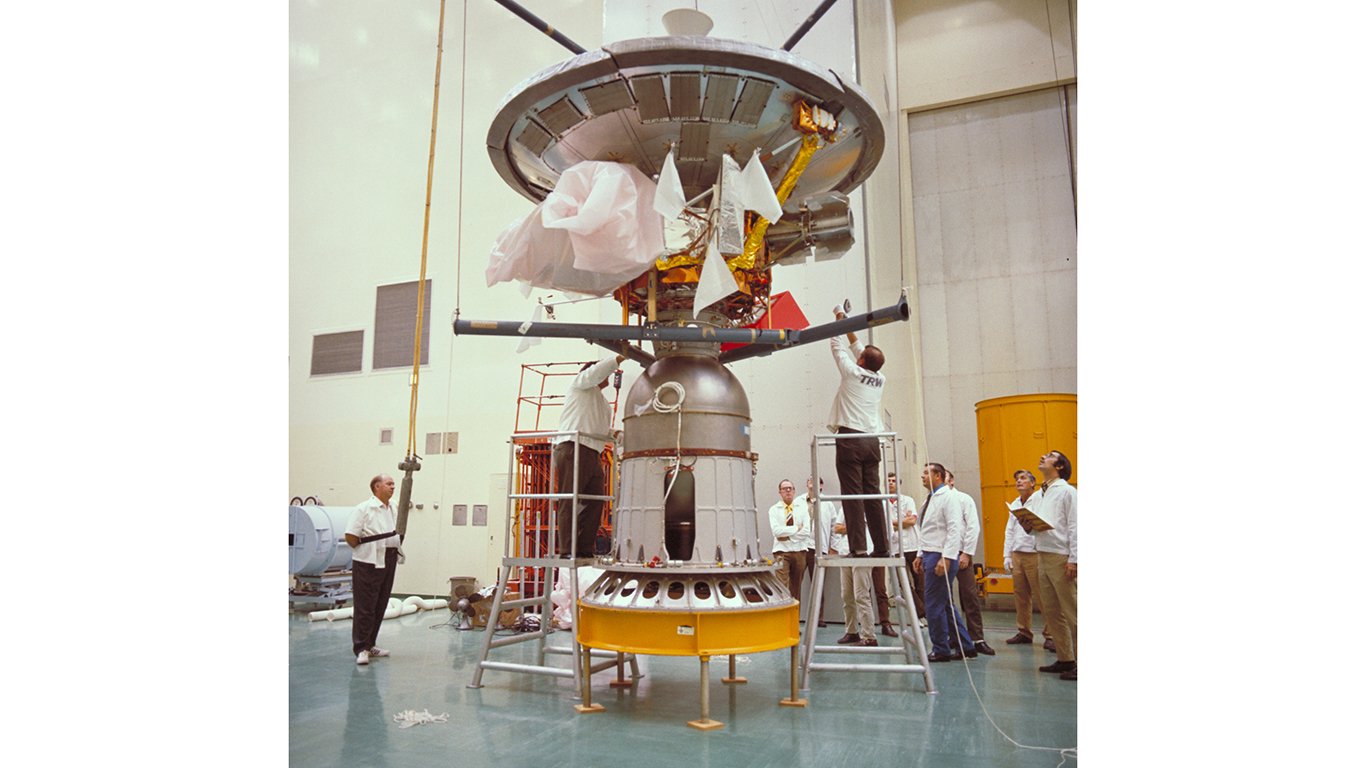
Source: NASA
23. NASA launches Pioneer missions
> Date: March 3, 1972-present
NASA launched the Pioneer spacecrafts beginning in 1972 to prepare for possible missions to the four large planets in the solar system — Jupiter, Saturn, Uranus, and Neptune. Pioneer 10 was launched in 1972 and in 1973, NASA put Pioneer 11 into space.
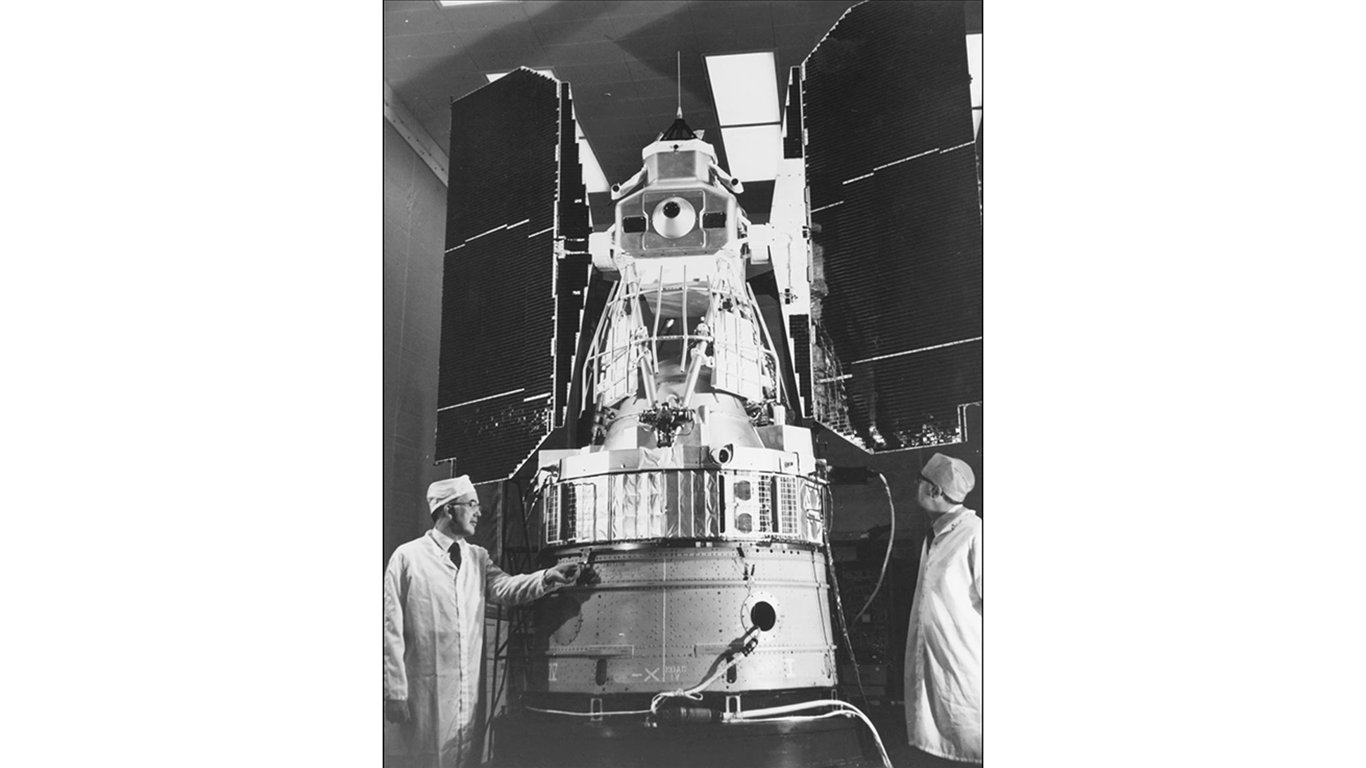
Source: NASA
24. Landsat goes into space
> Date: July 23, 1972-present
Landsat 1, launched in 1972, was a different mission for NASA. Originally called the Earth Resources Technology Satellite (ERTS), Landsat was an Earth resource mapping mission that provided data on vegetation, insect infestations, crop growth, and other land uses. Subsequent Landsat vehicles were launched in 1975 and 1978.
[in-text-ad-2]
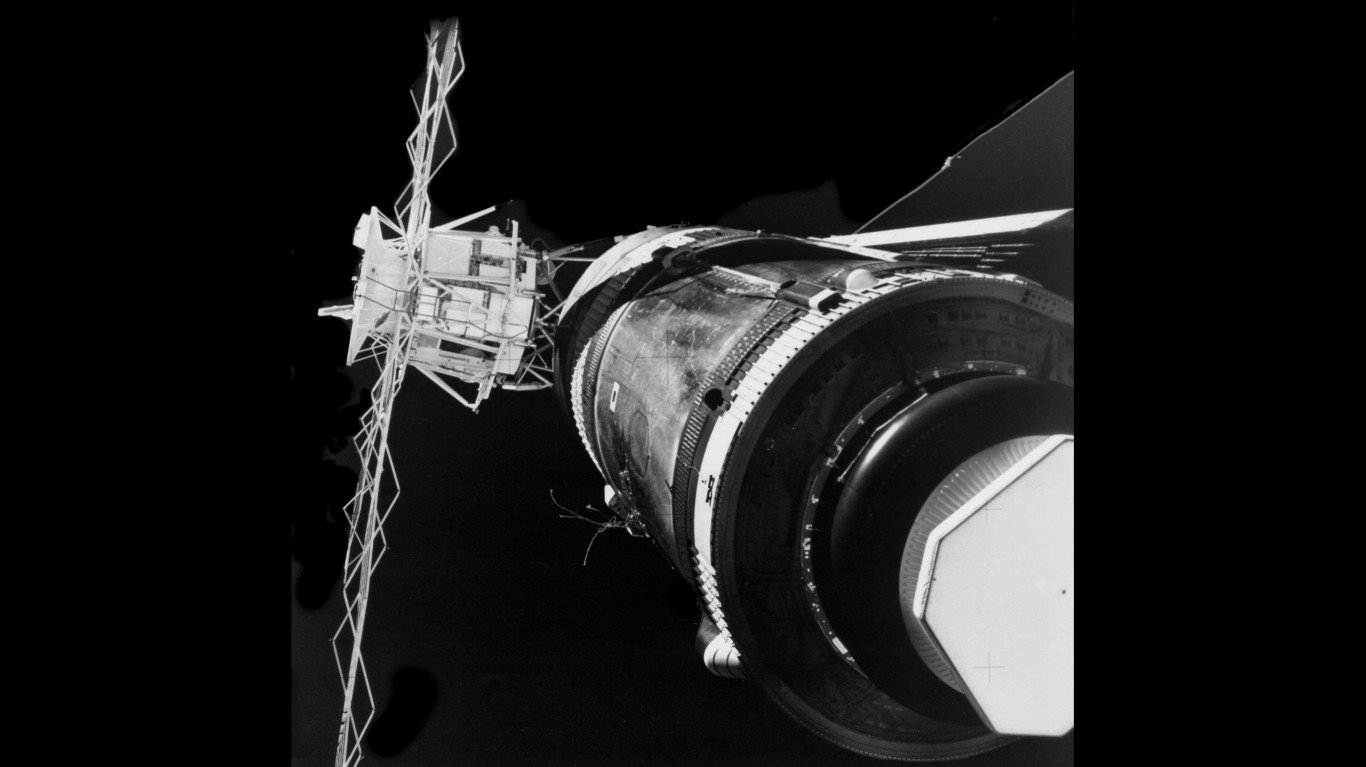
Source: nasacommons / Flickr
25. US launches Skylab
> Date: May 14, 1973
Skylab, the first American space station and laboratory, was launched into space on May 14, 1973. It orbited Earth for four years. Skylab had onboard a solar observatory, a multiple docking adapter, an airlock module with spacewalk hatches, and the orbital workshop.
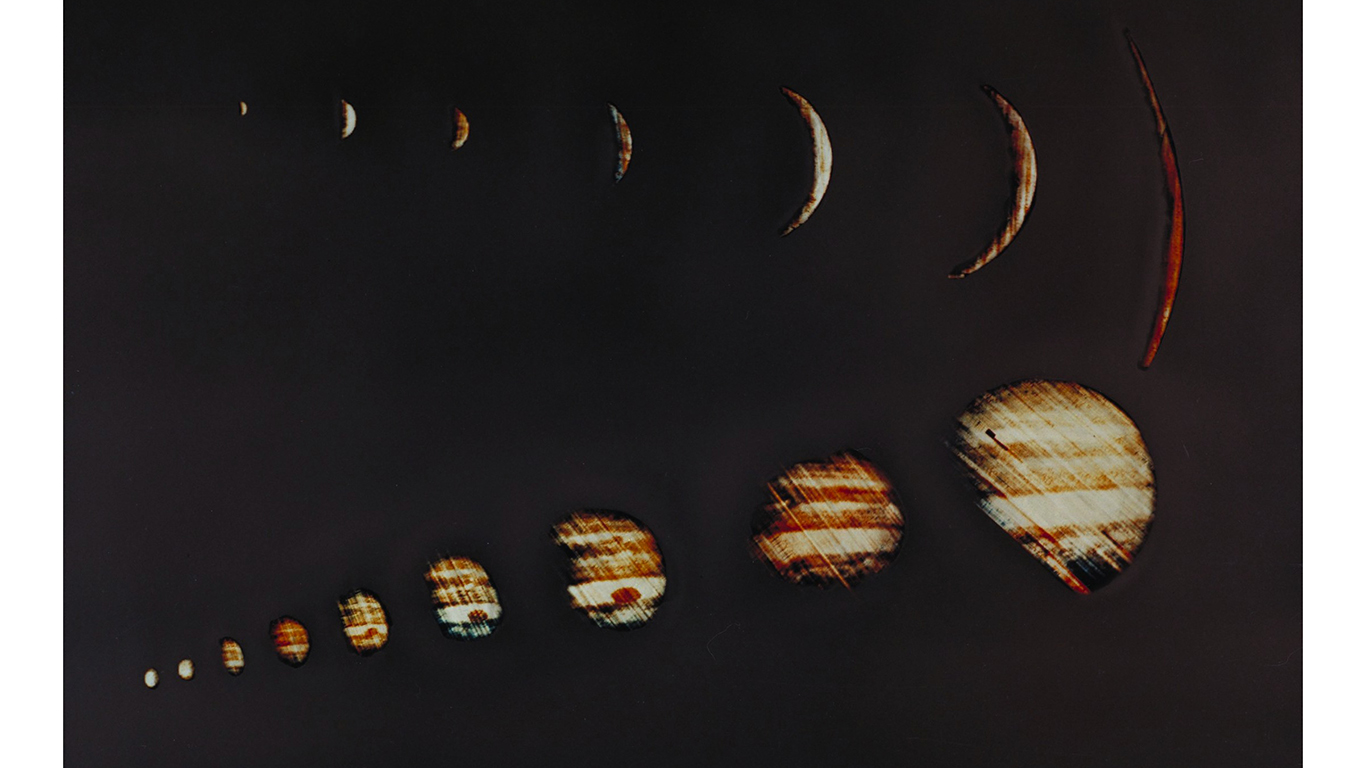
Source: NASA
26. Pioneer passes Jupiter
> Date: Dec. 3, 1973
Pioneer 10 made the first flyby of Jupiter in late 1973. The spacecraft was originally designed for a 21-month mission to fly by Jupiter. Instead, the mission lasted more than 30 years.
[in-text-ad]
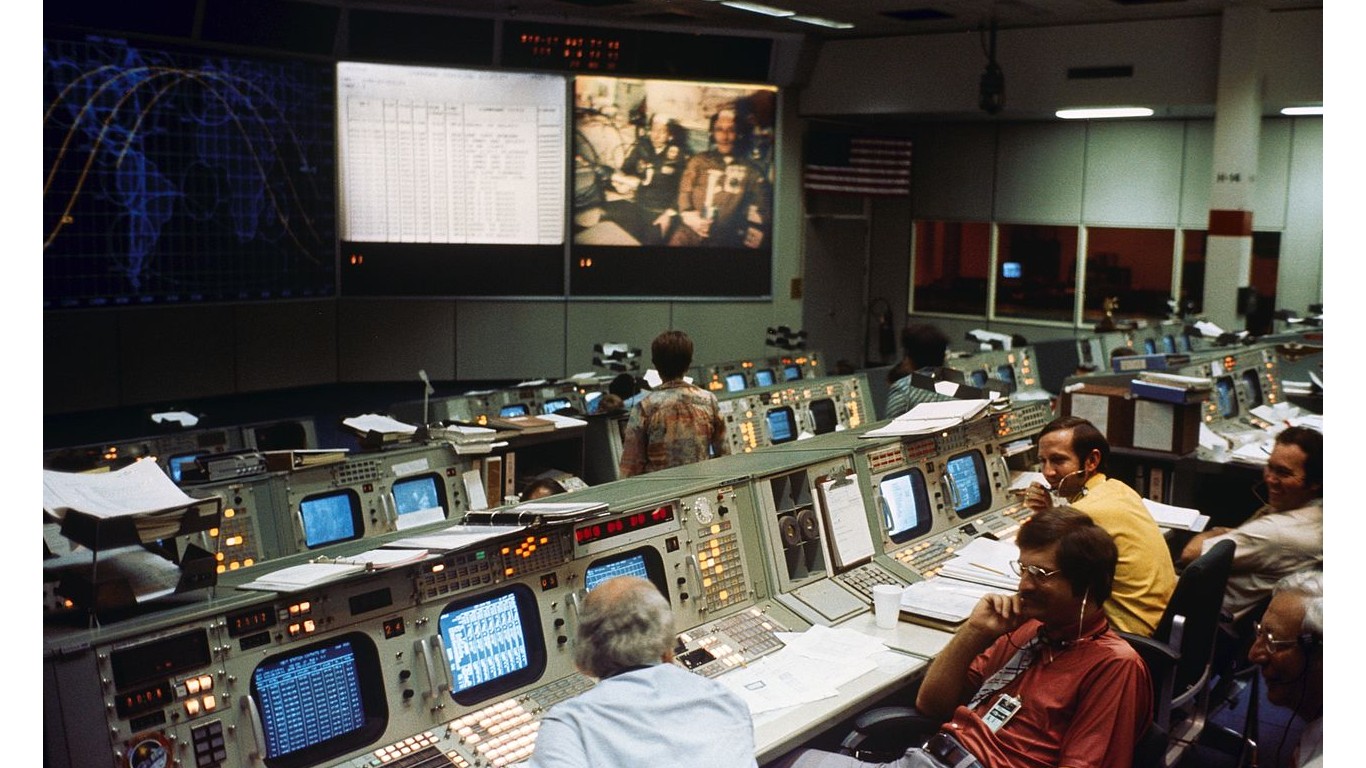
Source: Public Domain / Wikimedia Commons
27. Apollo-Soyuz rendezvous
> Date: July 15-24, 1975
At the height of the Cold War in the mid-1970s, the Soviet Union and the United States agreed to collaborate on a joint venture in space. The mission was intended to assess the compatibility of rendezvous and docking systems for American and Soviet spacecraft, as well as the feasibility of international space rescue and future joint missions.
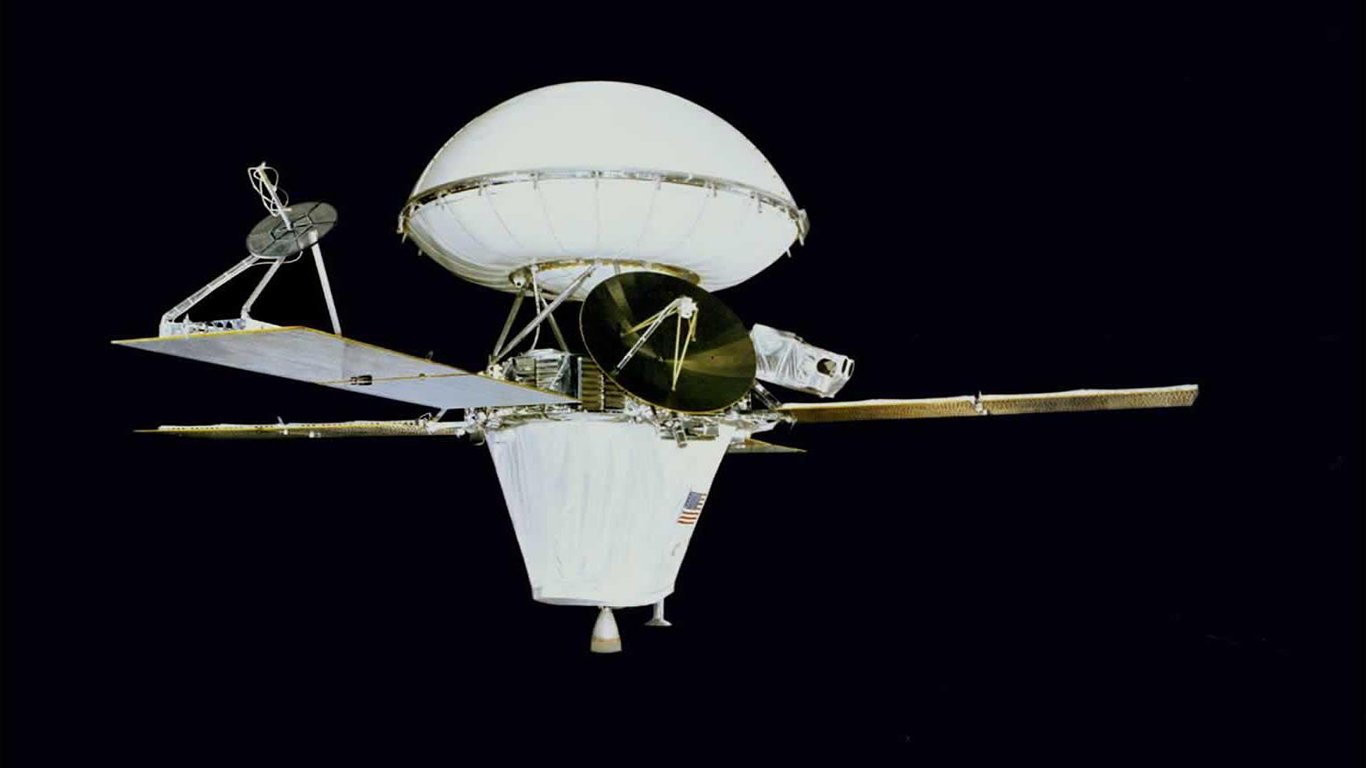
Source: NASA
28. Viking 1 lands on Mars
> Date: July 20, 1976
The Viking 1 was the first U.S. spacecraft to successfully land on Mars, after it was launched a year earlier. Even though the main mission of the project ended on Nov. 15, 1976, the spacecraft continued to transmit to Earth for six years after first touching down on Mars.
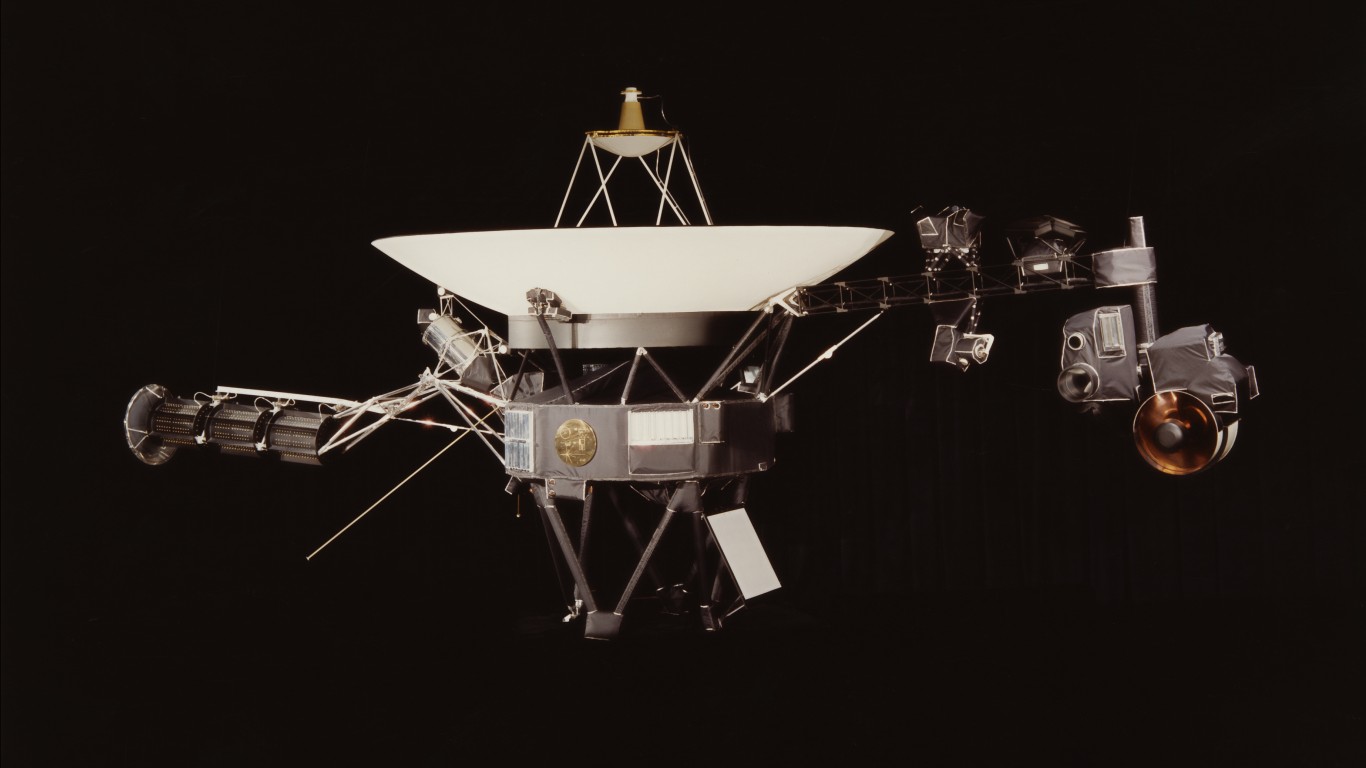
Source: NASA / Getty Images
29. Probes observe all planets
> Date: Aug. 20, 1977-present
In the late 1960s, NASA scientists discovered that every 175 years, the Earth and the large planets in the solar system line up on one side of the Sun. This configuration would allow for a close observation of all the planets in the outer solar system in a single flight. With that in mind, NASA launched two spacecraft: Voyager 2 on Aug. 20, 1977, and Voyager 1, on a faster, shorter trajectory, on Sept. 5, 1977. The launch window to observe the alignment was between 1976 and 1980.
[in-text-ad-2]
30. First shuttle takes off
> Date: April 12, 1981
Space Shuttle Columbia, piloted by astronauts John W. Young and Robert L. Crippin, took off for the first time. Columbia became the first airplane-like craft to land after orbiting Earth. The flight lasted about two days and six hours.
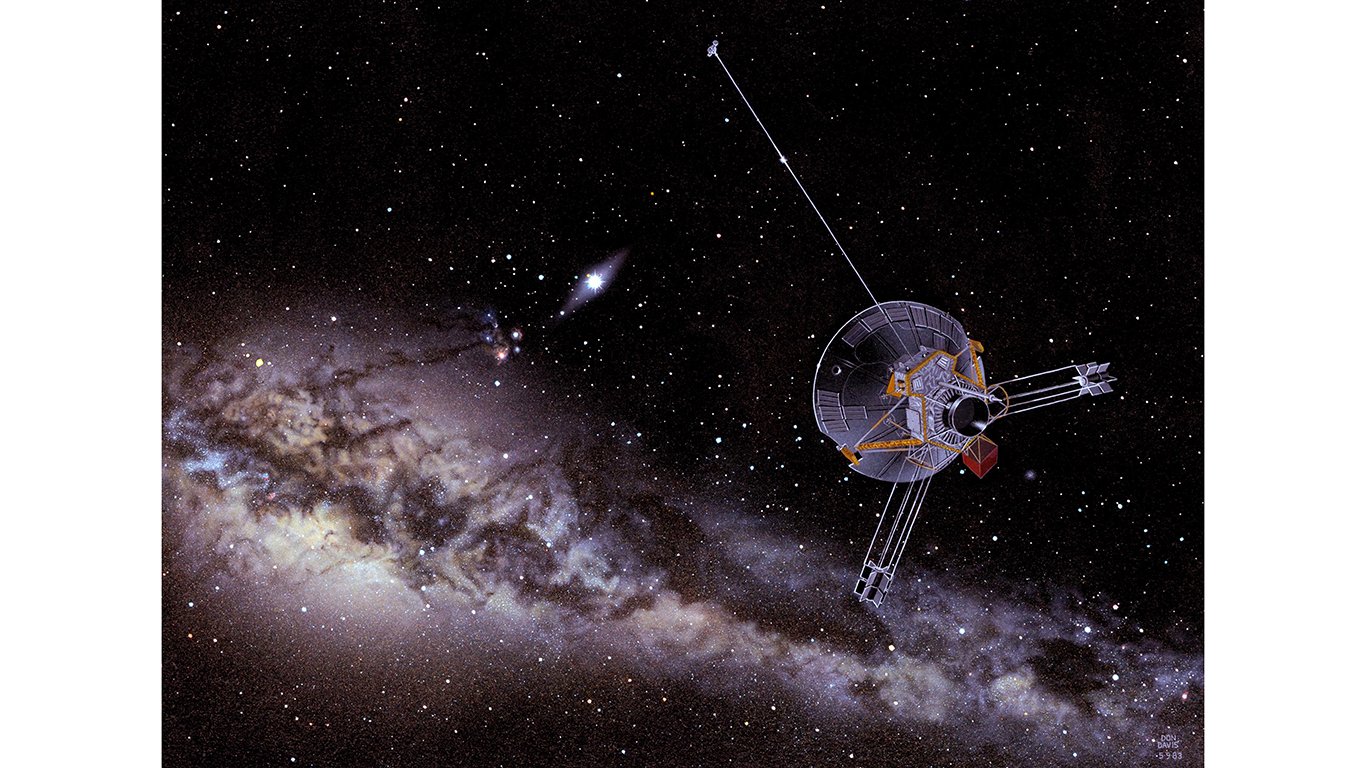
Source: NASA Ames
31. Pioneer flies beyond past solar systems
> Date: June 13,1983
Pioneer 10 flew past our solar system. The spacecraft sent its last signal to Earth in January 2003, when it was 7.6 billion miles away.
[in-text-ad]
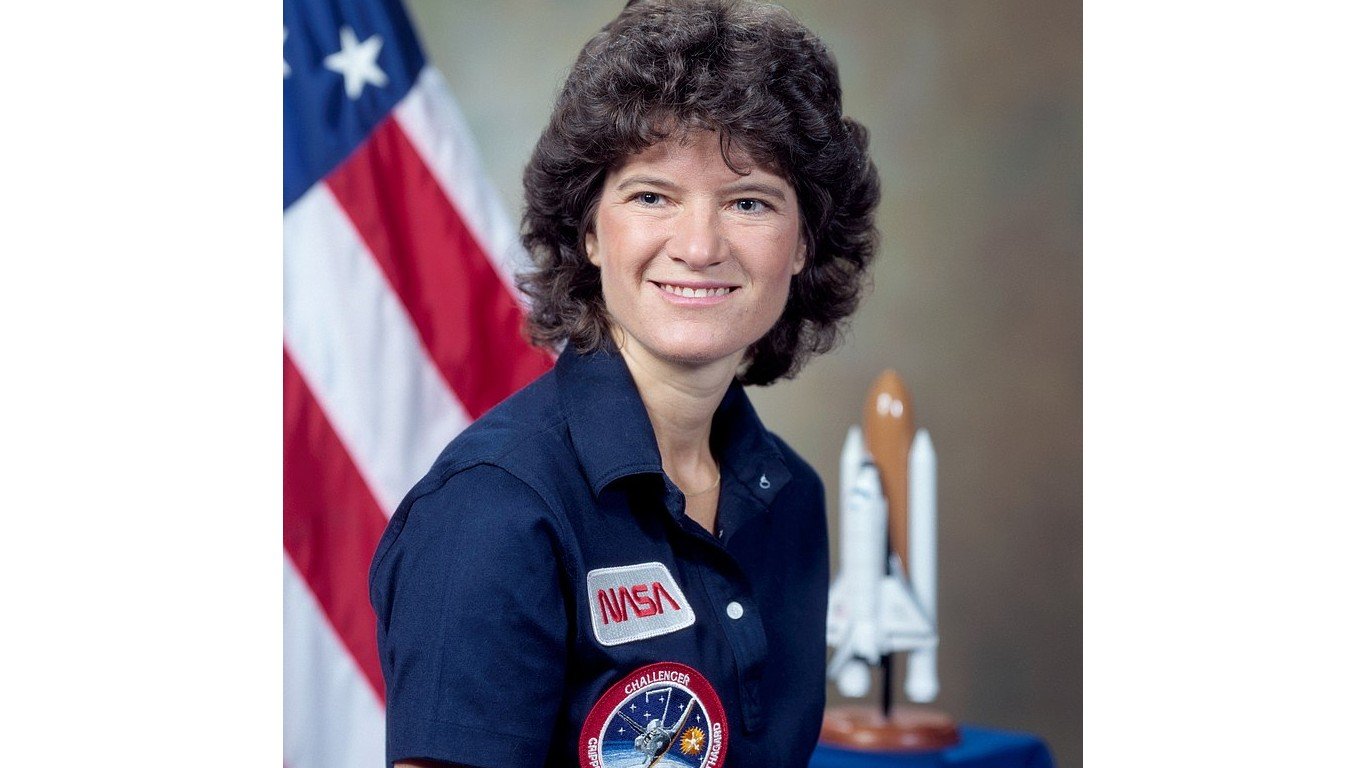
Source: Public Domain / Wikimedia Commons
32. Ride first US woman in space
> Date: June 18-24, 1983
Sally K. Ride became the first American woman in space as one of three mission specialists on Space Shuttle Challenger.
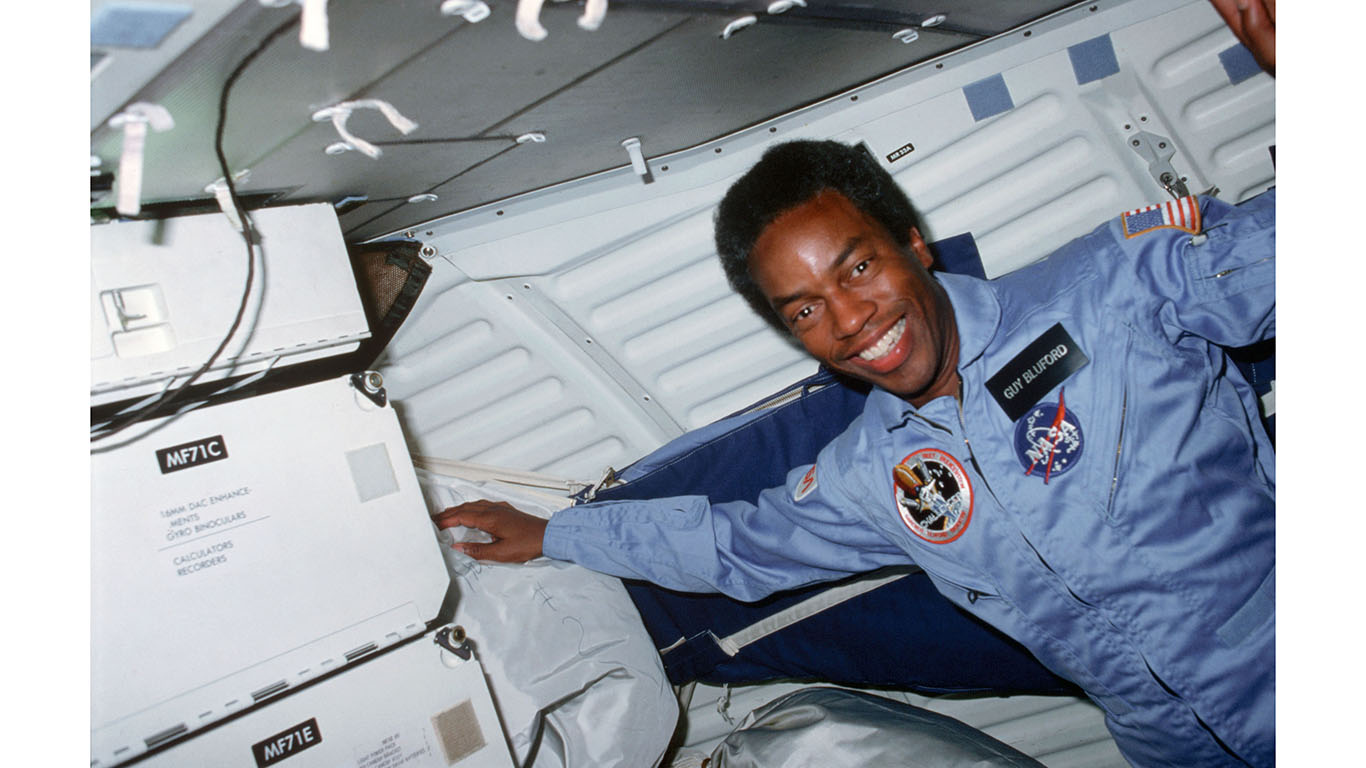
Source: NASA
33. First African American astronaut airborne
> Date: Aug. 30, 1983
The Space Shuttle Challenger carried the first African American astronaut, Guion S. Bluford, into space as a mission specialist.
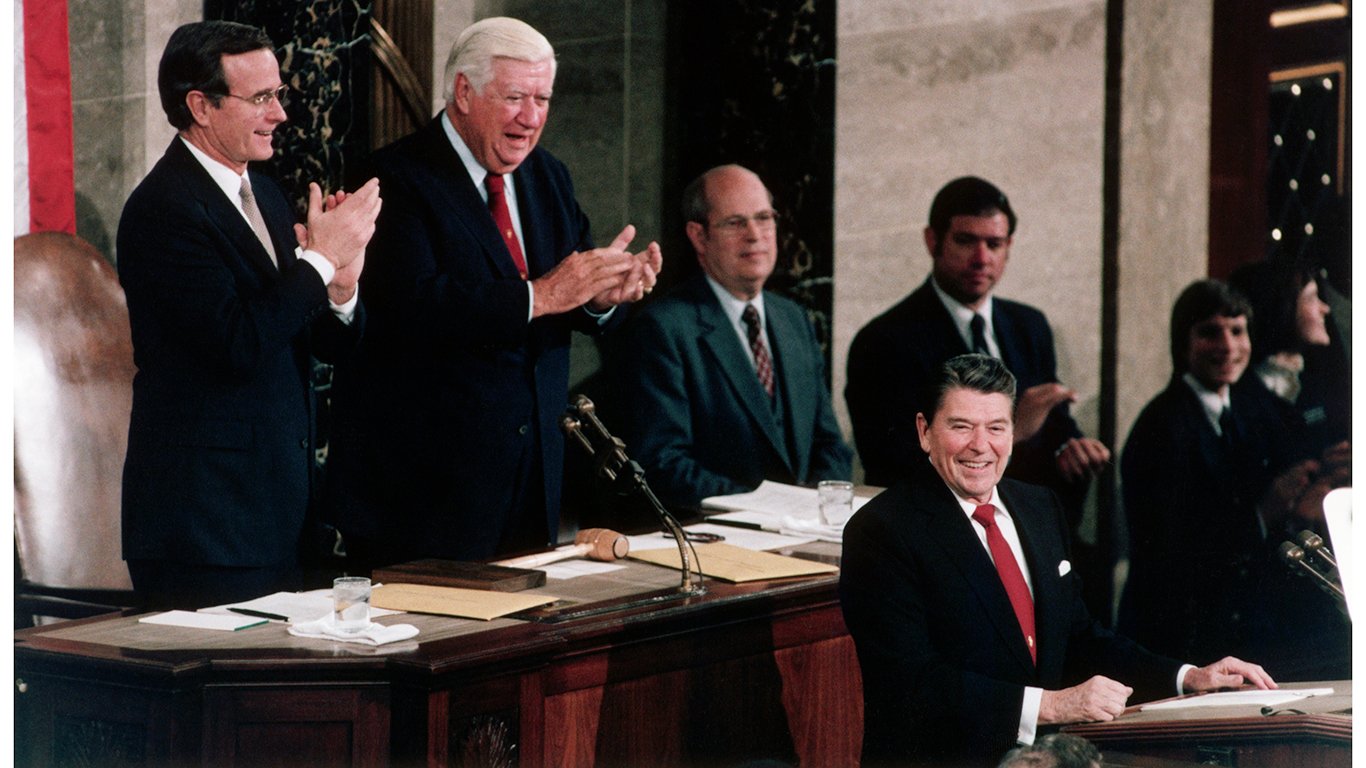
Source: © CORBIS via Getty Images
34. US advances space station project
> Date: Jan. 25, 1984
After a prolonged internal debate about the viability of the space station program, President Ronald Reagan announced during his State of the Union address that the United States would construct a space station within a decade.
[in-text-ad-2]
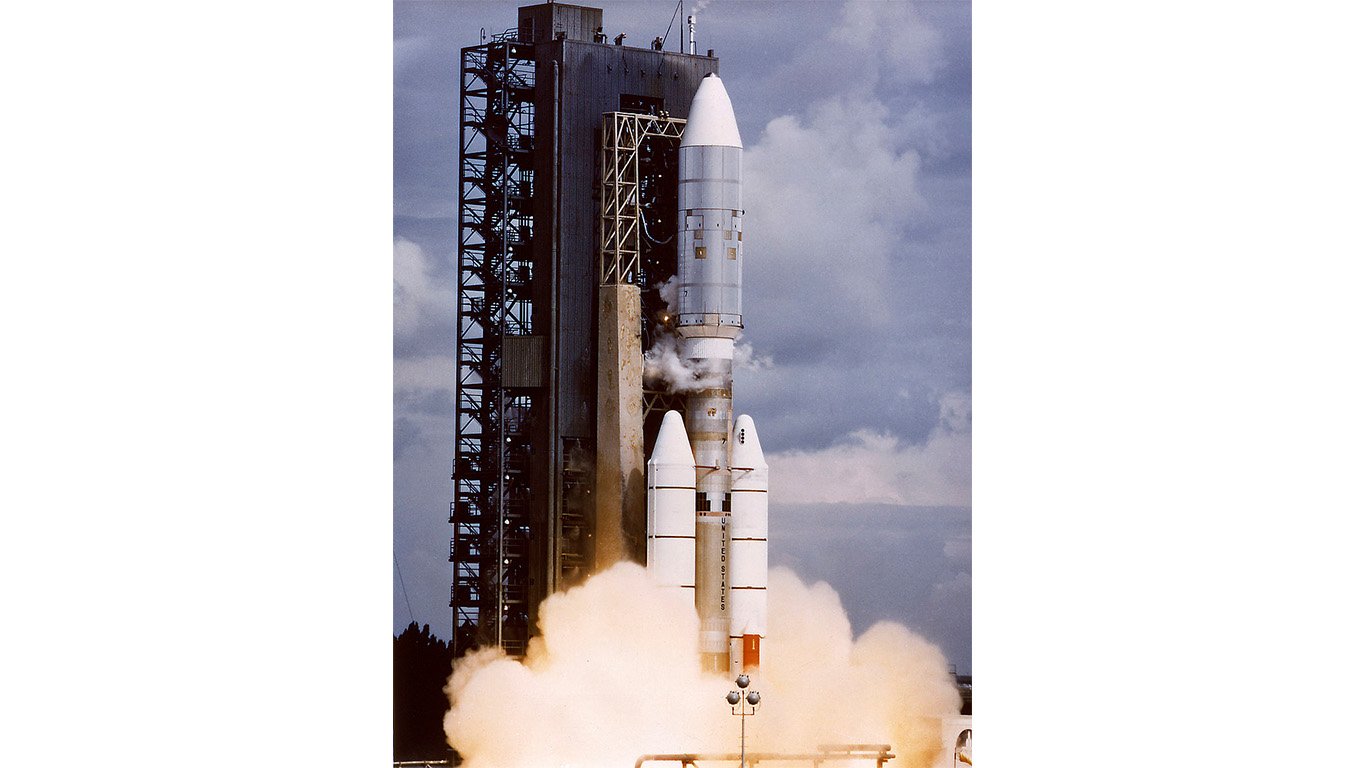
Source: NASA / Wikimedia Commons
35. Voyager 2 extends voyage
> Date: Jan. 24, 1986-Aug. 25, 1989
Voyager 2 flew by Uranus on Jan. 24, 1986 and past Neptune on Aug. 25, 1989. Voyager is the only spacecraft to study the four giant planets of the solar system up close.
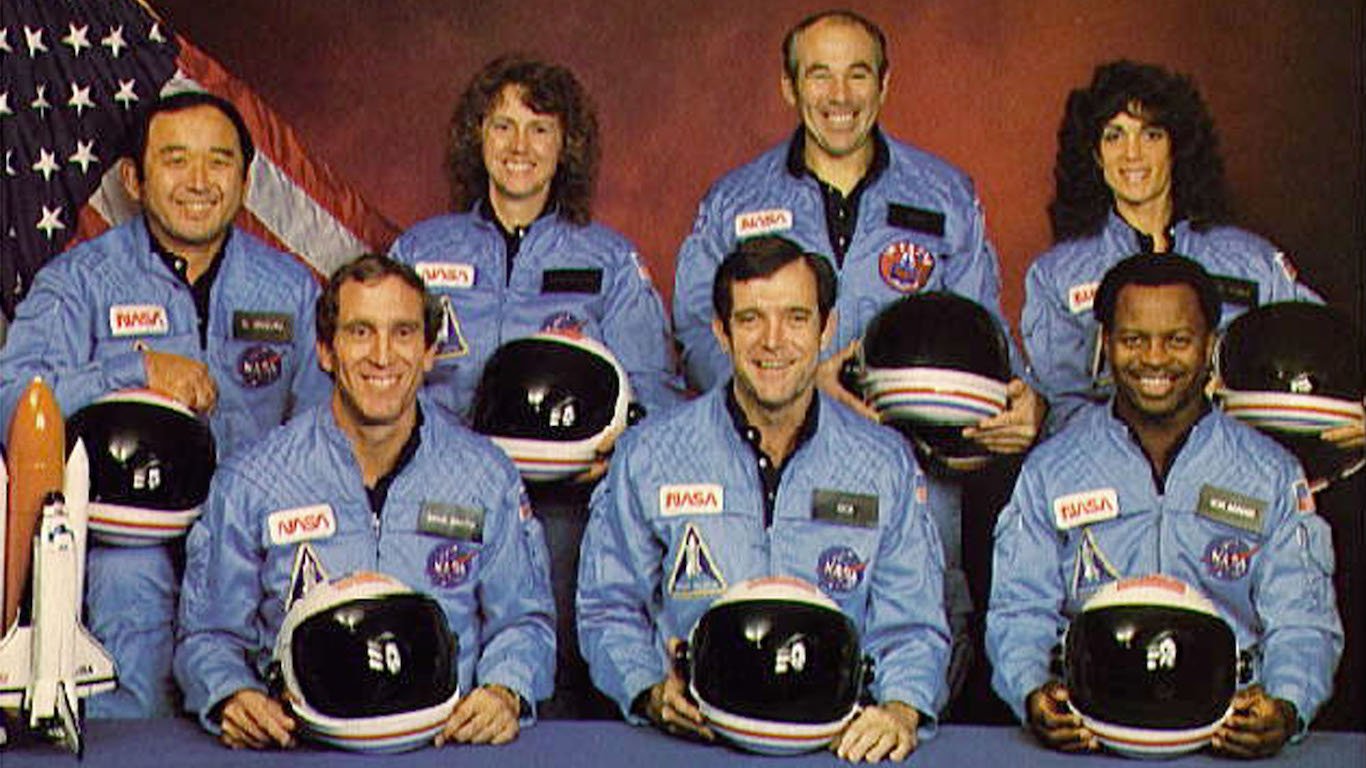
Source: Getty Images
36. Challenger explodes
> Date: Jan. 28, 1986
During a launch viewed by millions of people around the world, the Space Shuttle Challenger exploded, killing all seven members of its crew — Francis R. (Diсk) Scobee, Michael J. Smith, Judith A. Resnik, Ronald E. McNair, Ellison S. Onizuka, Gregory B. Jarvis, and Christa McAuliffe. The explosion occurred 73 seconds into the flight because of a leak in one of the rocket boosters that ignited the main liquid fuel tank. Following the tragedy, the shuttle program was suspended until September 1988.
[in-text-ad]
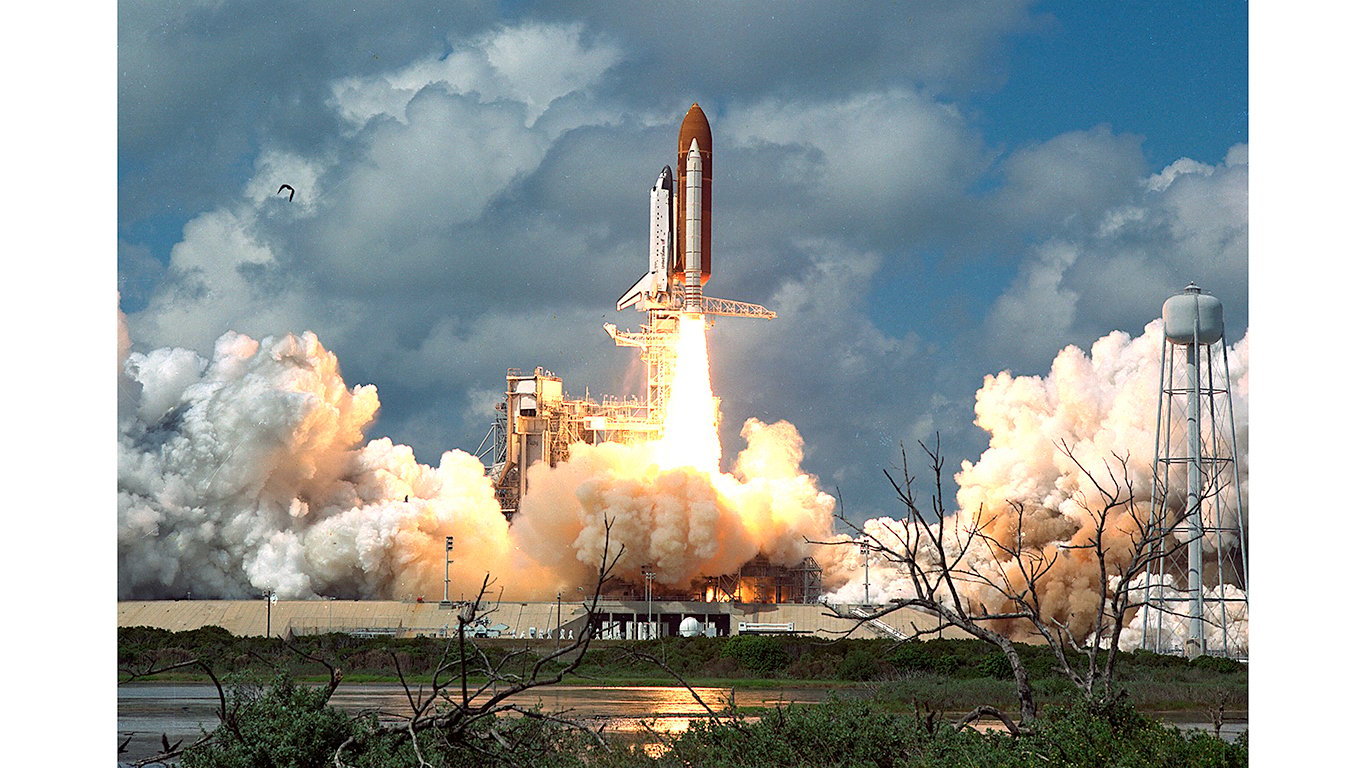
Source: NASA
37. Shuttle missions resume
> Date: Sept. 29-Oct. 3, 1988
The shuttle program resumed, with the flight of Discovery, the 26th shuttle flight.
38. Hubble Telescope goes into space
> Date: April 24, 1990-present
The Hubble Space Telescope was launched from the space shuttle in 1990 to a mission that lasts till today. After its launch, it was discovered that the telescope had a defect narrower than the width of a human hair in one of its mirrors. The flaw, which prevented the telescope from properly focusing and sending clear images, was fixed later by astronauts in a spacewalk. Hubble has made significant discoveries, including images providing evidence of what could be an enormous black hole.
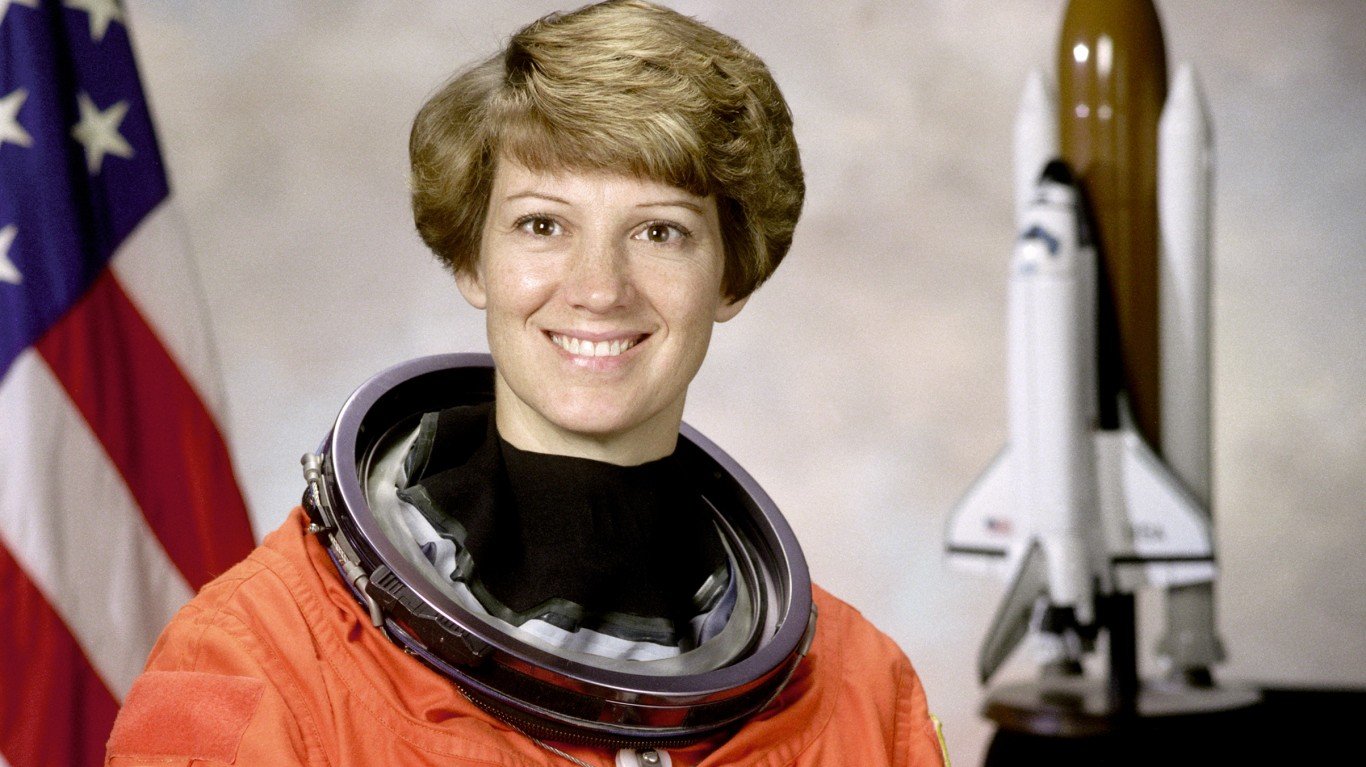
Source: nasacommons / Flickr
39. US woman pilots shuttle
> Date: Feb. 3-11, 1995
The flight of the Space Shuttle Discovery was noteworthy because it was the first shuttle piloted by a woman, Eileen M. Collins.
[in-text-ad-2]
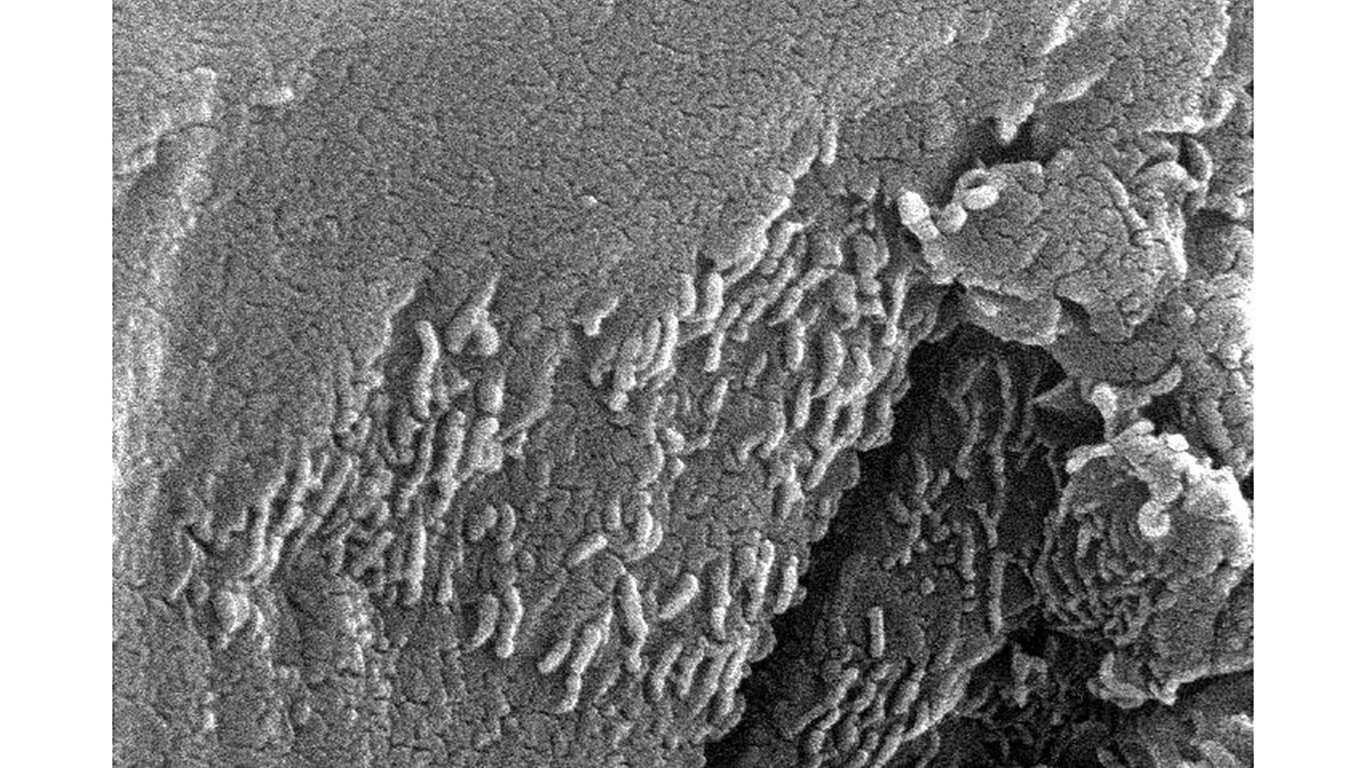
Source: NASA
40. Is there life on Mars?
> Date: Aug. 7, 1996
NASA scientists announced that they had discovered evidence, though not conclusive, that microscopic life may have once existed on Mars.

Source: Courtesy of NASA / JPL-Caltech / SETI Institute
41. Jupiter may have warm ice
> Date: Aug. 13, 1996
NASA’s Galileo probe produced data from Jupiter that indicated the giant planet’s moon Europa may contain “warm ice” or possibly liquid water, which are key to sustaining life. NASA officials emphasized that the photos do not conclusively prove this.
[in-text-ad]
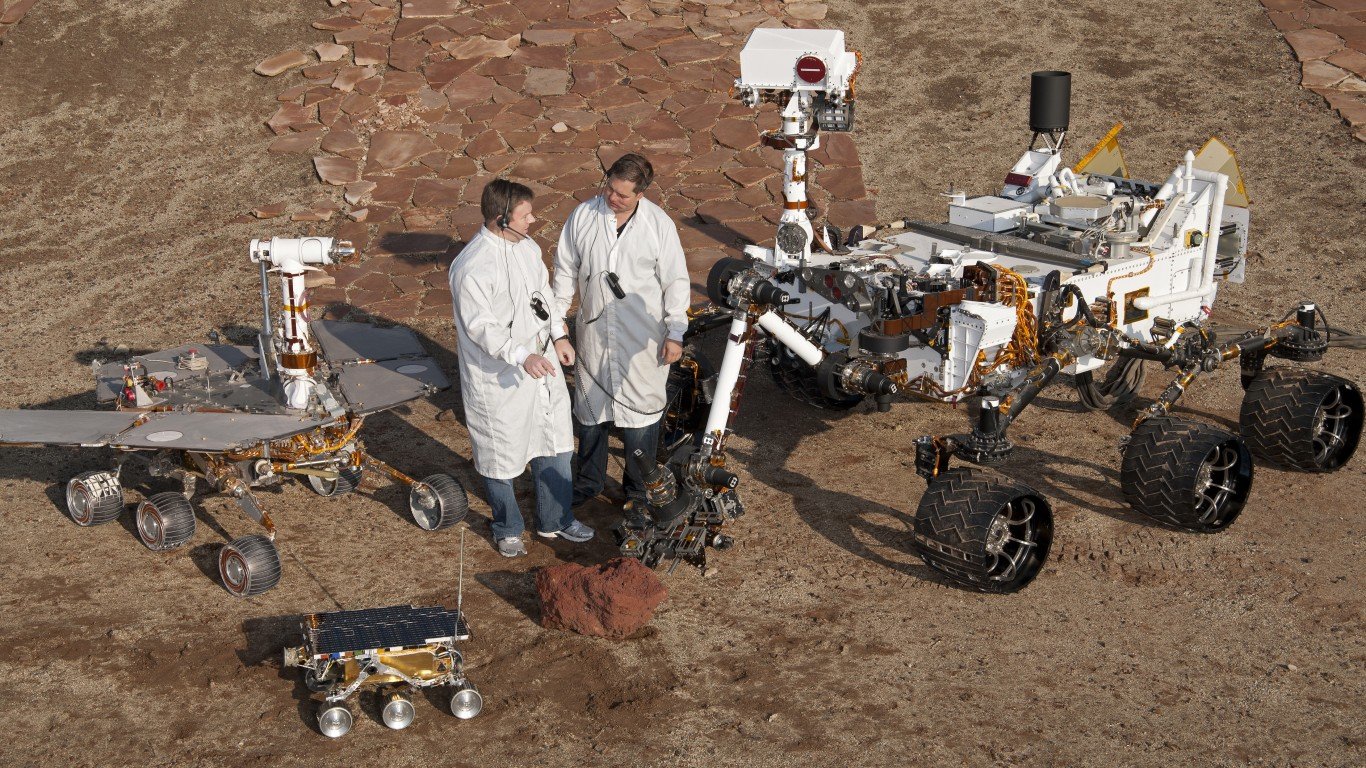
Source: NASA / Wikimedia Commons
42. Pathfinder lands on Mars
> Date: July 4, 1997
The Pathfinder probe landed on Mars by employing a parachute to decelerate its descent and a system of airbags to absorb the impact of landing. The probe carried a 23-pound robotic rover that recorded weather patterns and the chemical composition of rocks in the floodplain. The vehicle captured more data on the atmosphere, weather, and geology than scientists had expected.
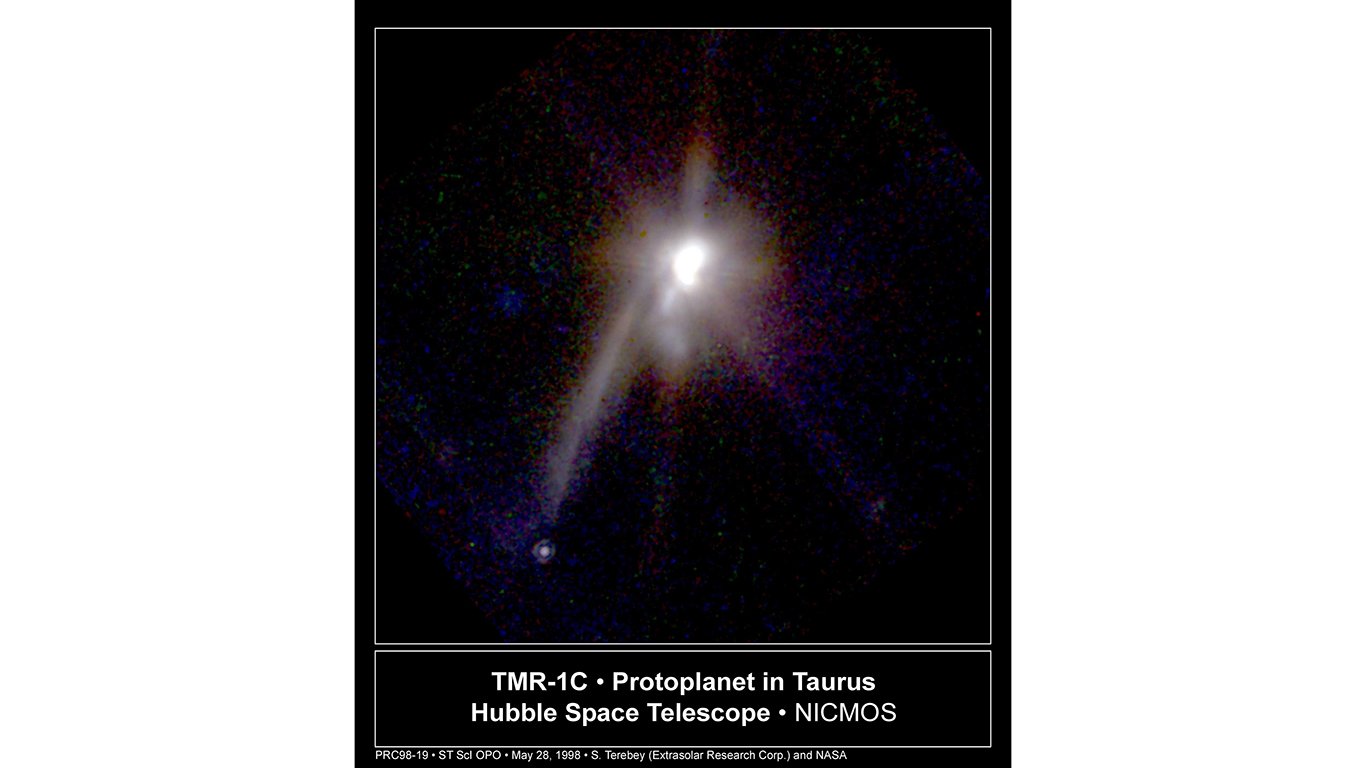
Source: NASA / Getty Images
43. Possible planet outside solar system
> Date: May 28, 1998
Astronomers spotted what was believed to be the first planet outside the solar system through the Hubble Space Telescope. The object was 450 light years from Earth.
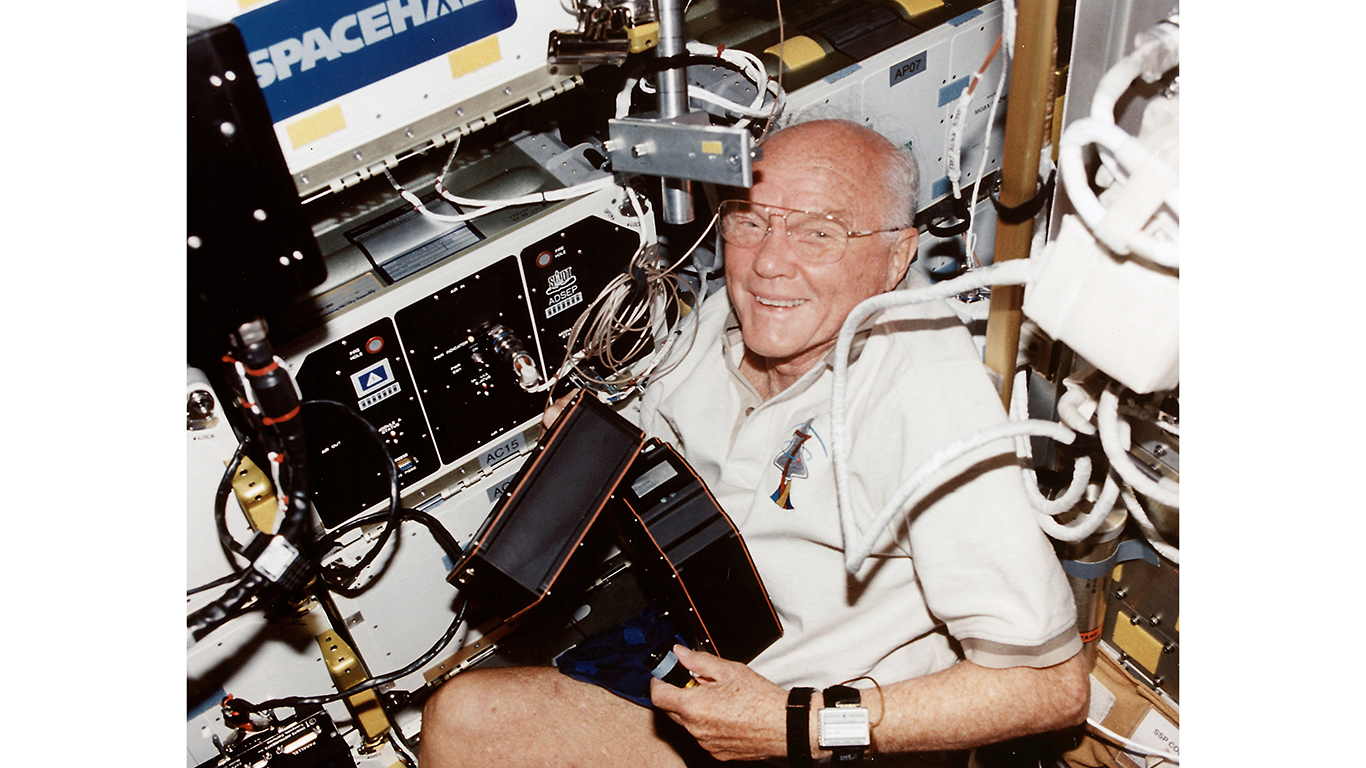
Source: NASA
44. Glenn is oldest man in space
> Date: Oct. 29, 1998
John Glenn, the first American to orbit the Earth, also became the oldest person to go into space, at age 77.
[in-text-ad-2]
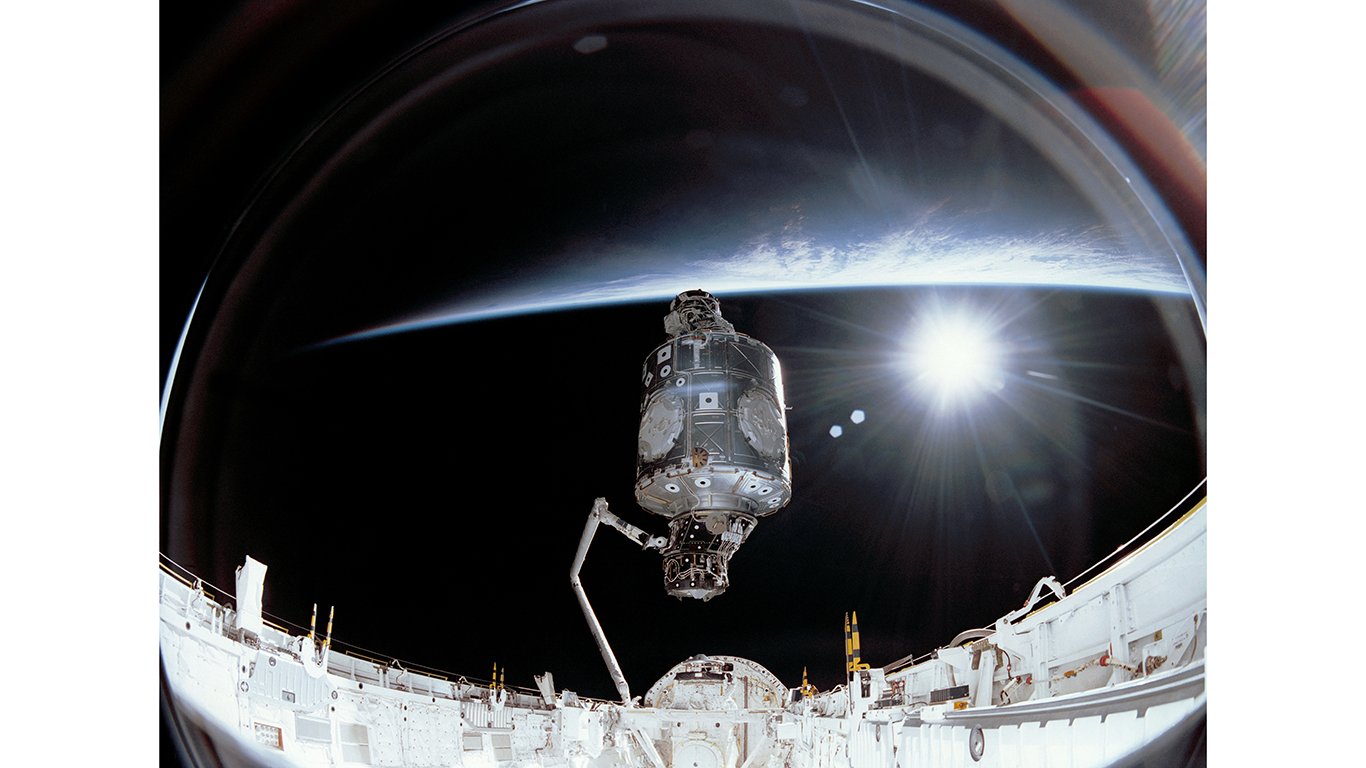
Source: NASA
45. International Space Station construction starts
> Date: Dec. 6, 1998
The building of the International Space Station began in 1998 when the U.S.-constructed Unity node and the Russian-built Zarya — the Russian word for sunrise — module joined in orbit.
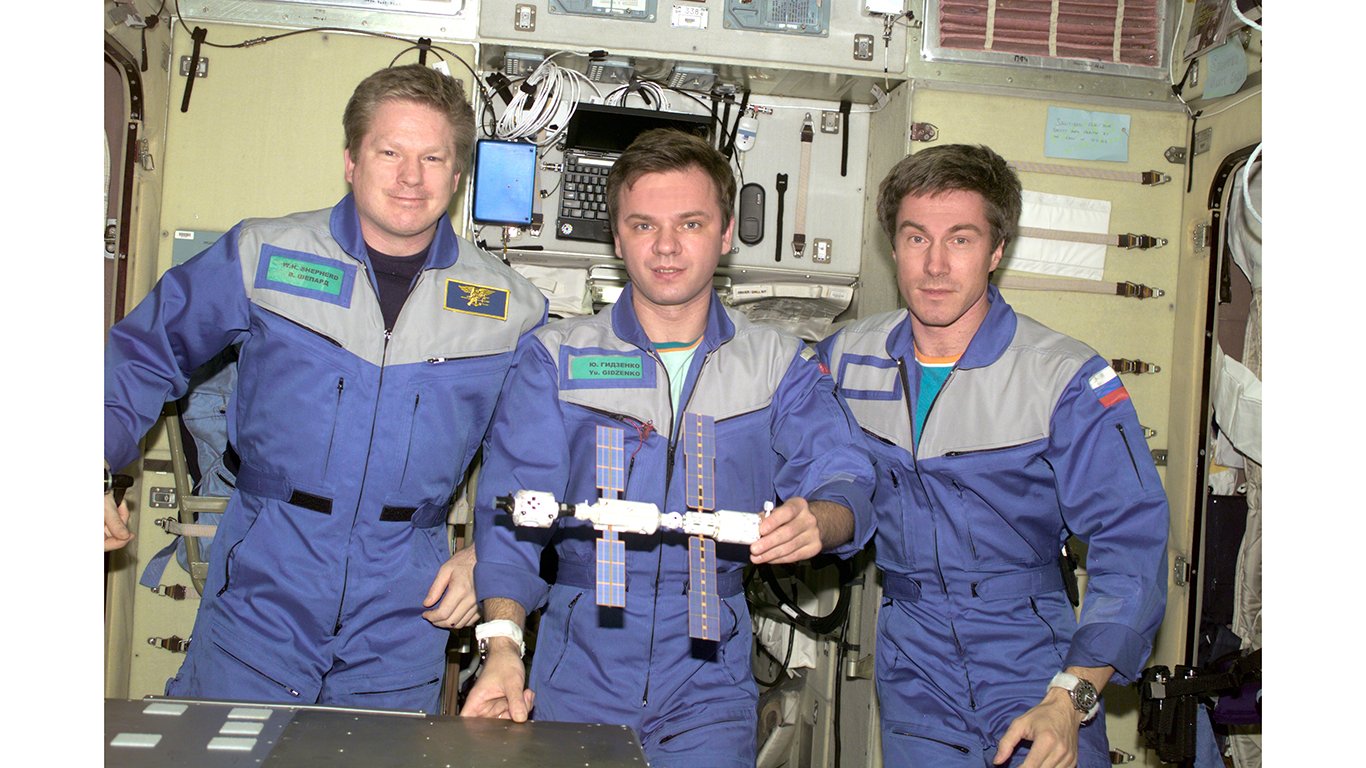
Source: NASA
46. Permanent space presence begins
> Date: Feb. 1, 2000
Humankind began permanent presence in space with the crew of Bill Shepherd, Yuri Gidzenko, and Sergei Krikalev aboard the International Space Station.
[in-text-ad]
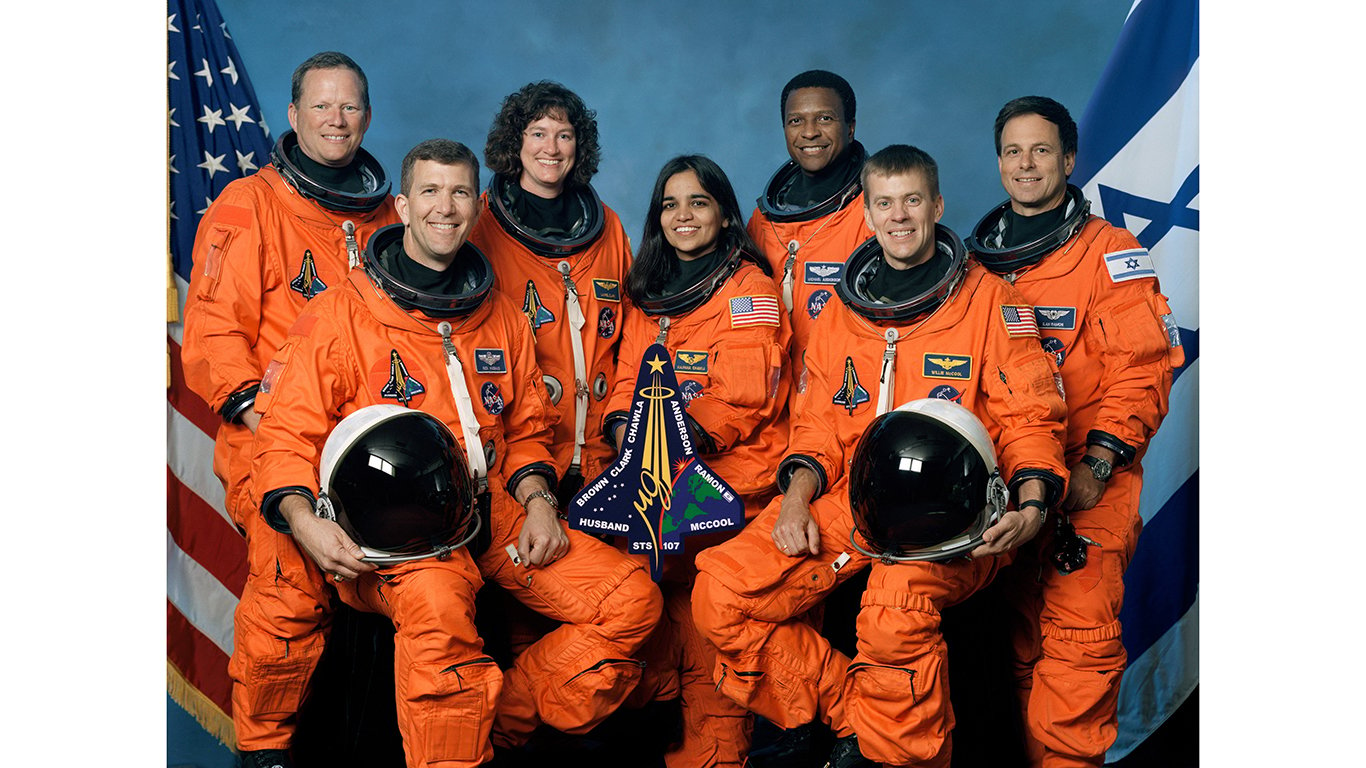
Source: NASA
47. Columbia disintegrates
> Date: Feb. 1, 2003
Another shuttle tragedy occurred in 2003, when the Columbia was destroyed on re-entry, killing all seven crew members — David M. Brown, William C. McCool, Michael P. Anderson, Kalpana Chawla, Rick D. Husband, Laurel B. Clark, and Ilan Ramon. NASA suspended shuttle missions for more than two years as it probed the disaster.
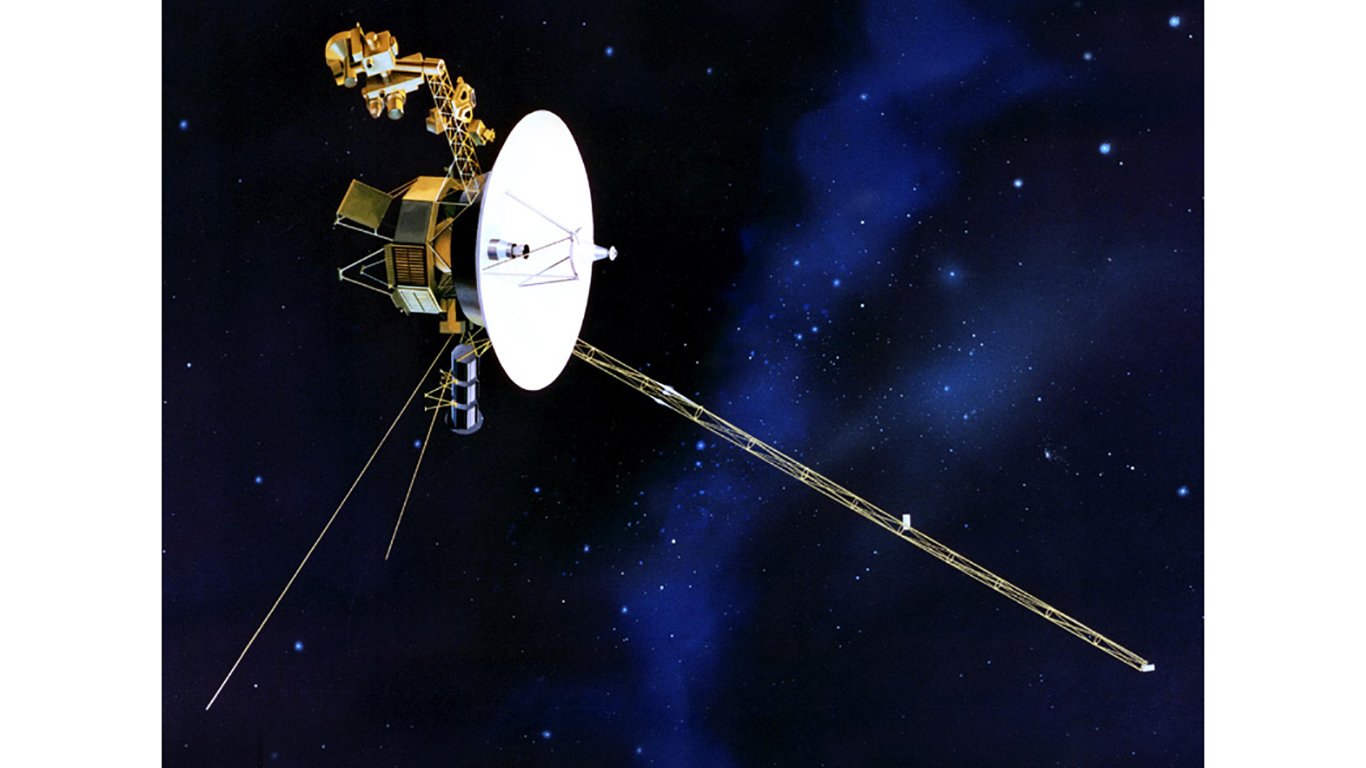
Source: NASA / JPL-Caltech
48. Voyager heads into interstellar space
> Date: April 25, 2012
Voyager 1, launched on Sept. 5, 1977, when Jimmy Carter was president, became the first spacecraft to reach interstellar space.
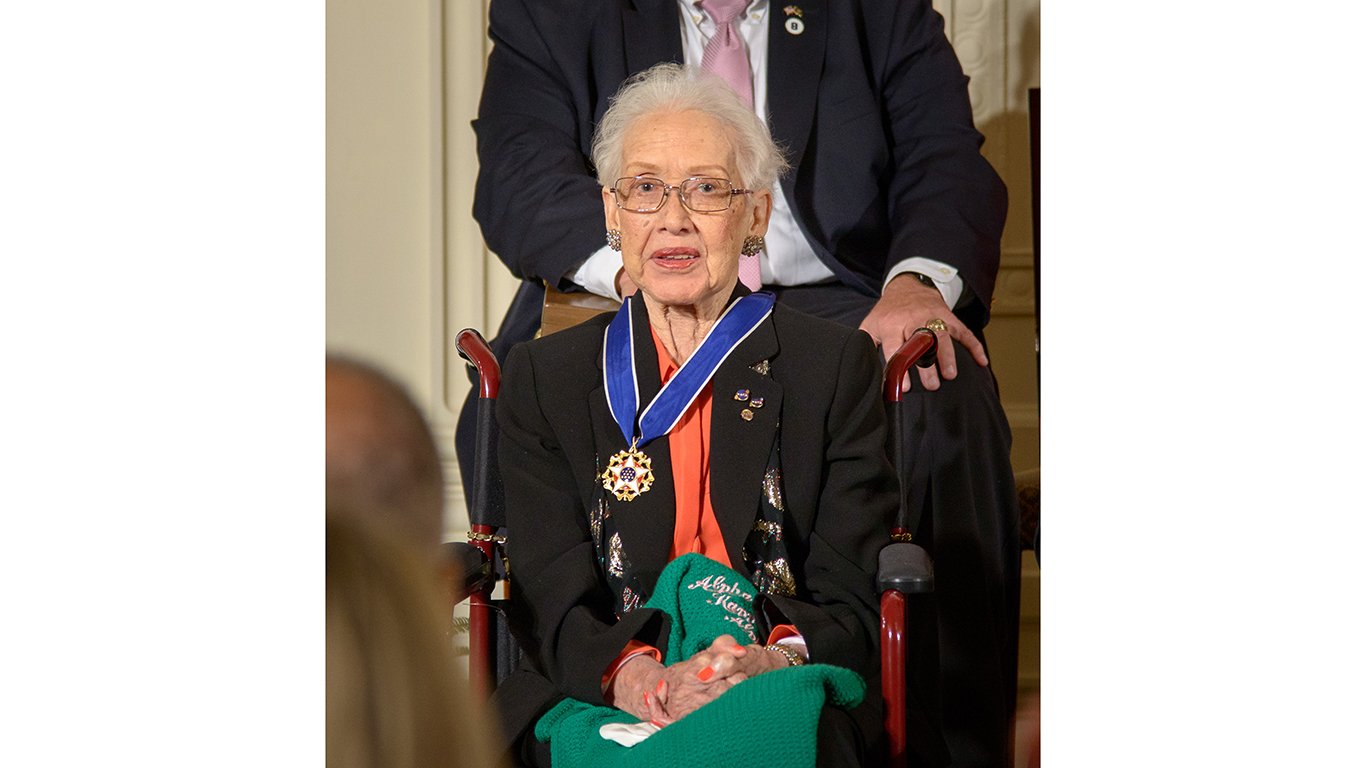
Source: NASA / Bill Ingalls
49. Female ‘computer’ receives medal
> Date: Nov. 24, 2015
Katherine Johnson, one of the African American women portrayed in the film “Hidden Figures,” received the Presidential Medal of Freedom from President Barack Obama. Johnson and other female “computers” were recognized for contributing to the success of the U.S. space program in the 1960s.
[in-text-ad-2]
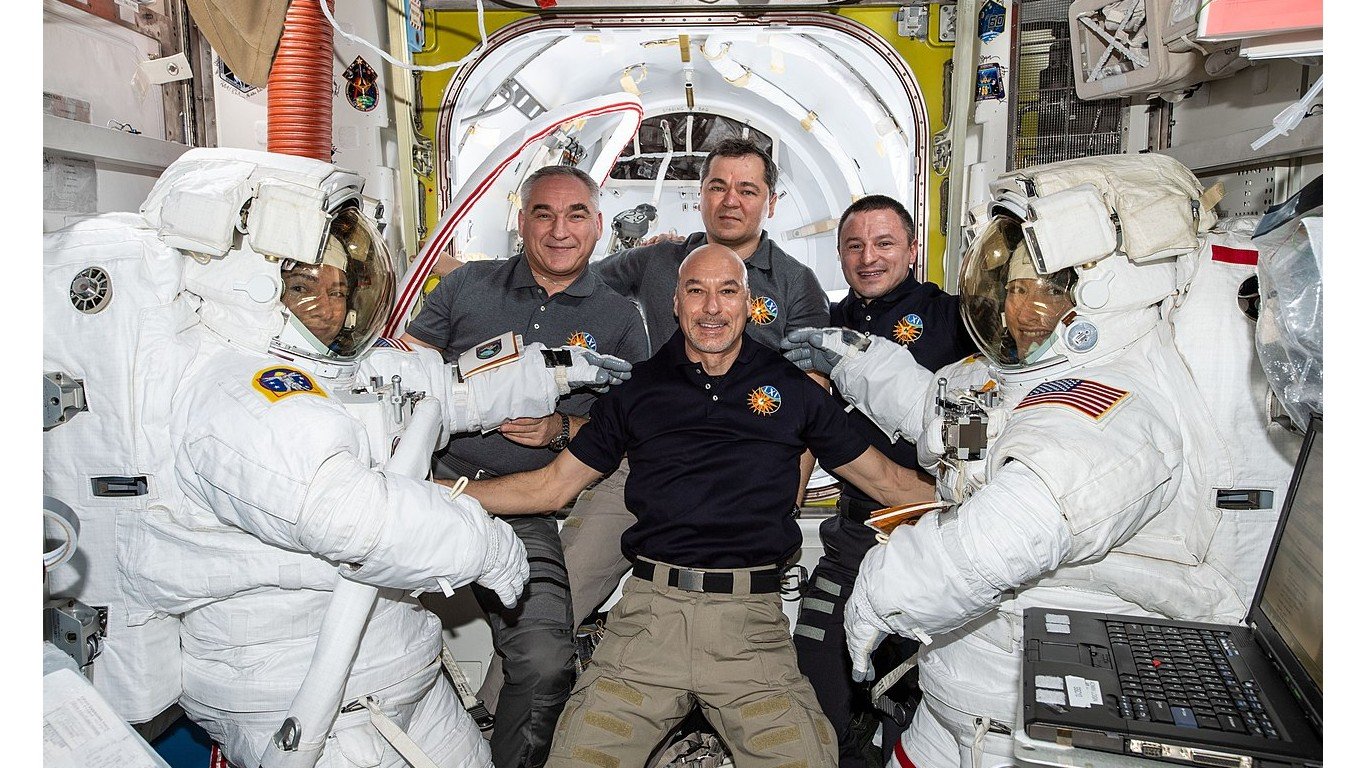
Source: Public Domain / Wikimedia Commons
50. First all-woman space walk
> Date: Oct.18, 2019
Astronauts Christina Koch and Jessica Meir were the first all-women spacewalk team. Among the 15 women who have done spacewalks, 14 have been astronauts from NASA.
Take This Retirement Quiz To Get Matched With An Advisor Now (Sponsored)
Are you ready for retirement? Planning for retirement can be overwhelming, that’s why it could be a good idea to speak to a fiduciary financial advisor about your goals today.
Start by taking this retirement quiz right here from SmartAsset that will match you with up to 3 financial advisors that serve your area and beyond in 5 minutes. Smart Asset is now matching over 50,000 people a month.
Click here now to get started.
Thank you for reading! Have some feedback for us?
Contact the 24/7 Wall St. editorial team.
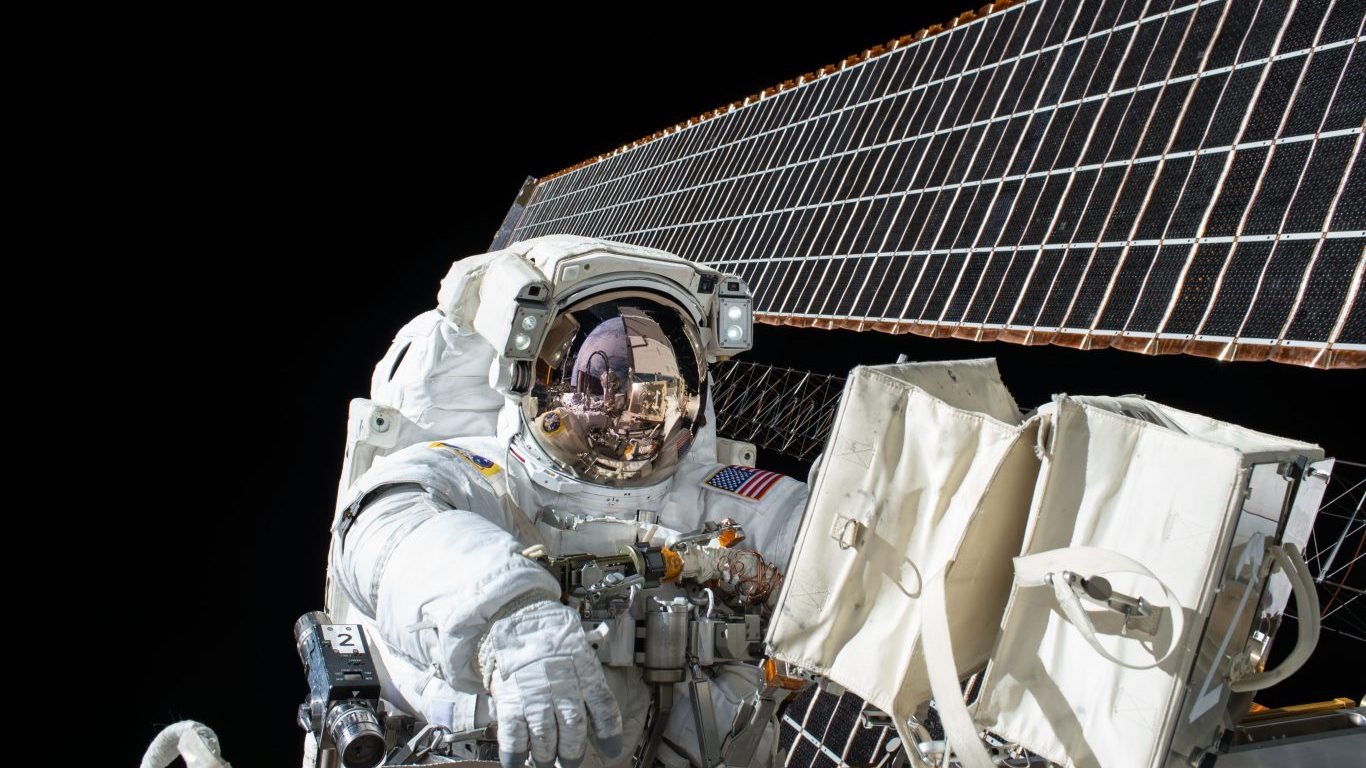 24/7 Wall St.
24/7 Wall St.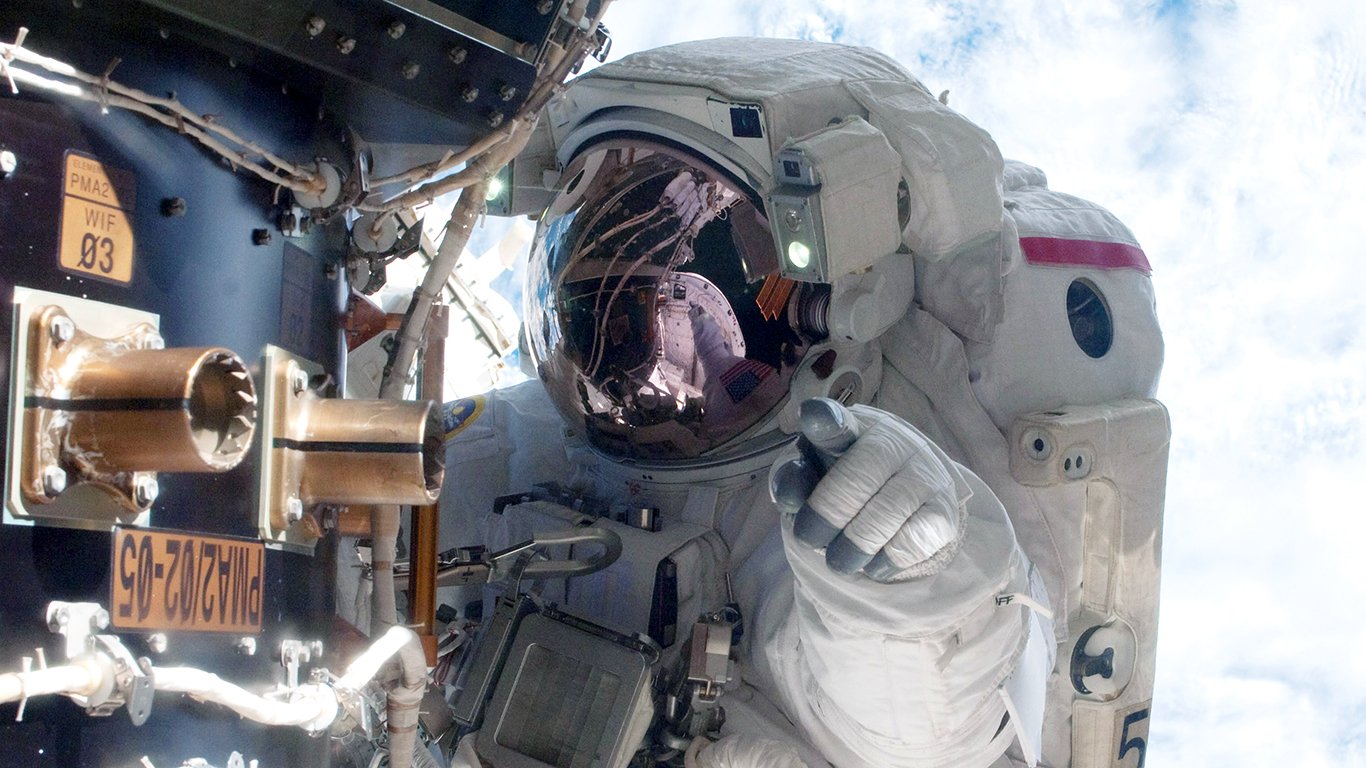 24/7 Wall St.
24/7 Wall St.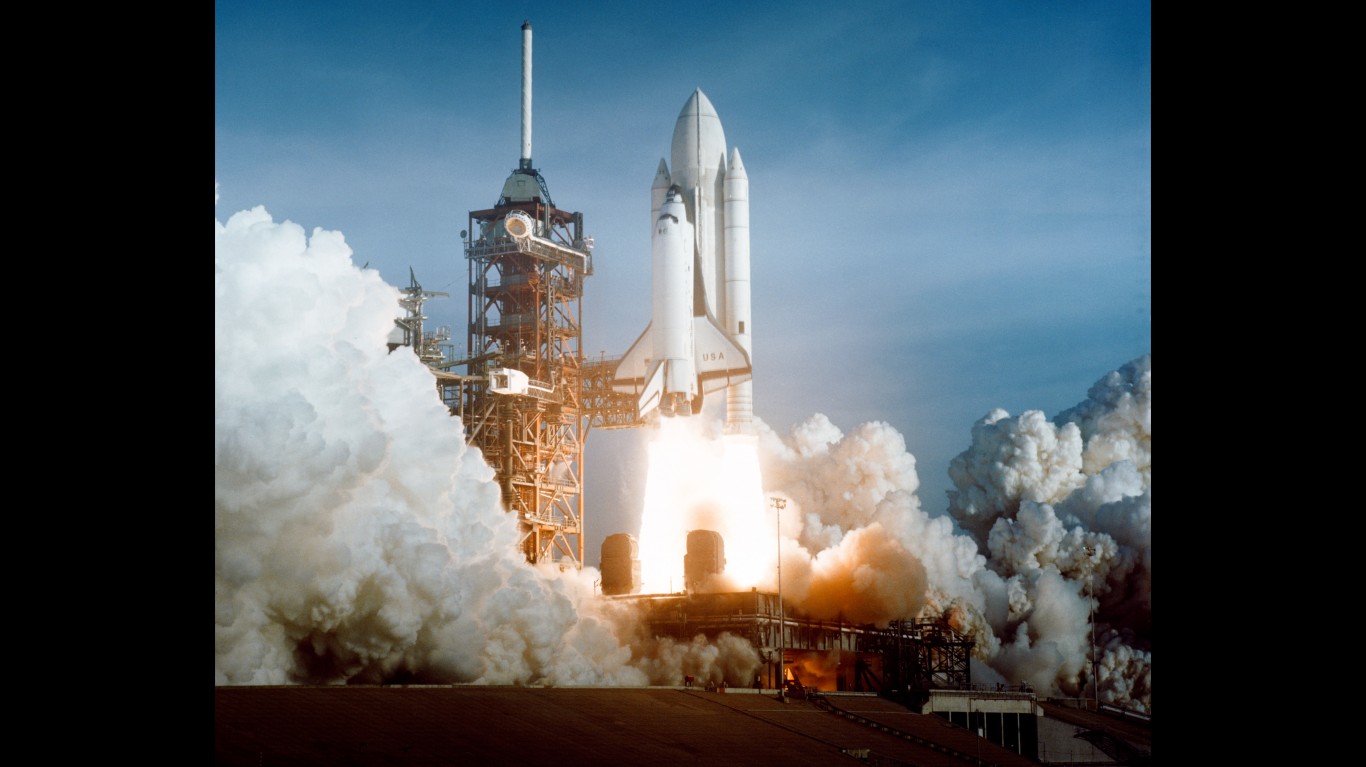
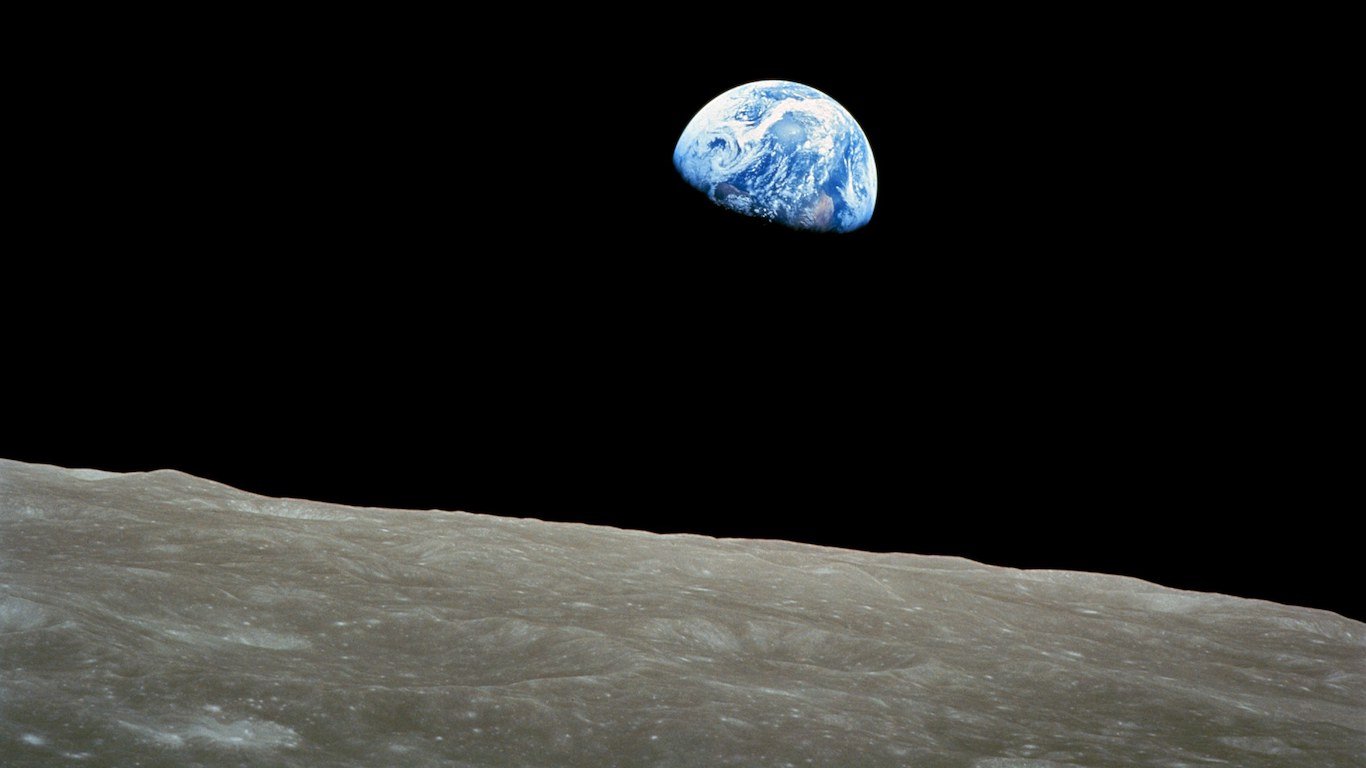 24/7 Wall St.
24/7 Wall St.